#because there are things it is absolutely important to bring up!! but simply being dependent on someone else is not fucking one of the
Explore tagged Tumblr posts
Text
We can't expect individual people to have safety nets and contingency plans for everything when as a society we have gutted any safety net we once built.
The way people can get trapped in abusive situations, or be stuck without finances if your spouse dies, is absolutely important to talk about and bring awareness to.... but we can't keep doing it by throwing disabled people under the bus because this happens to us all the time. And unlike someone choosing to be a trad wife we really have no choice in our situation.
We need more robust safety nets, community supports and resources to help people from getting stuck with no way out of abusive relationships and bad situations.
We can't personal responsibility our way out of societal problems.
sometimes, when someone is criticizing the stay-at-home-wife movement being sold to young women by conservatives, it loses focus on the "selling you a repressive and authoritarian worldview" point and slides into... well... implicitly leaving disabled people to die.
and what i mean by that is, it's all well and good to say you should do everything in your power to make sure you're not financially dependent on another person... but what if "everything in your power" is "nothing?"
what if how society is structured means you have absolutely no choice but to be financially dependent on another person? what if it's that, or simply die? this is the choice disabled people are faced with. not even uncommonly... frequently. people who need full-time carers, or who have very expensive medication and assistive tech needs, or people who simply can't work in the current job structure, often have the choice of... well... find someone to be financially dependent on, or face a slow, painful death, usually without housing. even if you're lucky enough to get on a fixed income, it's never enough to even make monthly rent, and that's not counting the extra costs of food, toiletries, medicine...
in fact, a lot of disabled people (certainly notably women, but absolutely not limited to, and in fact i see this happen to trans men over and over again, and i've lost a dear transmasc friend because of this) are funneled into being stay-at-home parents and homemakers, forced to do all of the domestic labor and childcare in exchange for a roof over their head and access to their medications/assistive tech, and isolated in all the same ways tradwives are isolated. in fact, this even happens with leftist partners/parents. all the time, i see disabled people disappear from public life entirely, lose contact with all their friends, and consign themselves to a life of cleaning up after someone while struggling to handle their own health needs, even having their disabilities exacerbated and their lifespans shortened by the amount of domestic labor they're required to do.
but it isn't a choice... it can't be fixed by focusing on academia or work... and it's not due to buying into conservative propaganda. all i ask is, please remember this, and please never leave us out of these discussions.
#there was a video I watched recently by a creator i usually admire on this topic#and i get it since the target was talking to trad wife lifestyle folks but still#its not like trad wife folks can't also be disabled and it honestly painted being dependent as being lesser and i hate that#and the derisive way the creator talked about getting an “allowance” as though that is the worst thing in the world#i have gotten a portion of my spouse's paycheque since forever because we agreed I should have my own money that I controlled#this looks very much like the allowance that was derided but it also is helping me build my own personal savings#and while i still rely on my spouse's income to do so#once it transfers to my account it is 100% MY money and I honestly don't think that making fun of#people having an allowance like that is the best idea if you also want them to be as financially independent as possible#because sometimes those allowances are the only thing that people have to be able to get out of these situations because they save#up as much as they can covertly through this allowance#so like... idk very disappointed how we are talking to and about this recent conservative fad#because there are things it is absolutely important to bring up!! but simply being dependent on someone else is not fucking one of the#things we have to shit on right? cmon...
2K notes
·
View notes
Note
That scene from Lilo & Stitch (2002) where Nani sings "Aloha 'oe" to Lilo the night before she thinks social services will take her away but it's Sonic staying with Tails till he falls asleep the night before the guardianship court hearing
Oh, absolutely. That scene has been on repeat in my mind for the past several days, my friend. I totally get it. Not sure if you've read it already, but I do have this bonus scene from that night (“I’ll stay until you fall asleep.”) that I wrote a little over a year ago for "Sometimes the Picket Fence isn't Perfect." But with Lilo and Stitch (2002) fresh in my mind and feeling so soft about that scene in particular, I decided to add onto that night a little bit as a writing warm-up. It's recommended to read that fic first for context if you haven't already, then come back here, but please enjoy 💙
For eleven years, Sonic didn’t have a family.
He’d never been the right fit for anyone, never knew what it felt like to be part of something bigger than himself. His edges too uneven and colors too vibrant to simply press him into an empty space in a puzzle and watch him fade into a picture perfect family. On his own, he’d always been enough to paint the whole picture. What you see is what you get. Just Sonic the Hedgehog.
To think it took less than a year to turn his entire worldview on its head.
Despite telling Tails how important it was for them to get some sleep the night before their guardianship hearing, Sonic was still wide awake hours after the fox kit had finally drifted off. He said he’d stay until he fell asleep, but for once he couldn’t bring himself to move. By the dusty moonlight filtered through the open window, green eyes traced a path they’d long-since memorized across Tails’s shadowed face. Even in the dark, he could tell the creases of concentration and worry lines had been smoothed out by the peace of an unconscious mind, too busy recharging for the day ahead of him to be bothered with what-ifs or hypotheticals.
On normal nights, Sonic could relate.
This was anything but.
No matter what the court’s decision was in several hours, nothing would stop them from being family. He’d meant that. It hadn’t been an empty platitude to placate his best friend into going to bed; it was a fact. One he’d fight to the death to defend.
Sonic the Hedgehog spent eleven years without his family. He wasn’t going to give it up because some stranger refused to sign a scrap of paper. Their imperfect pieces fit each other and the picture they painted together had been beyond anything Sonic ever could’ve imagined.
People always assumed Sonic saved Tails but, while that was true to some degree, it went both ways. Sure it was a lot of work having someone depend on him when he didn’t know the first thing about taking care of anybody but himself, and there’d been times where he wondered if he’d done the right thing by taking Tails with him in the first place. If it had been selfish to keep him. But when the coolest kid on the planet looked up at him and called him his big brother…
How was he supposed to say no to that?
Tails saw him from the very start. He got him on a level no one else had ever bothered to aim for. And he loved him anyway. He wanted him anyway.
Those two days where he’d disappeared, Sonic’s world had been thrown off its axis as a new doubt took root that he hadn’t let himself question since he made the decision to be Tails’s brother. Was he what Tails needed? Was he what Tails wanted? Was the picture they made together, the one Sonic thought was perfect in all their imperfections, what Tails envisioned for his life?
Or did he want something… more?
Something Sonic couldn’t give him.
A mom. A dad. A picket fence. He couldn’t imagine what else. Not when he’d give the kid anything—everything.
…Including give him up, if that was what he really wanted.
But it wasn’t. He didn’t. And Sonic should’ve known, should’ve trusted, that Tails wanted their little, funny-shaped family just as much. That he’d been just as scared of losing it all.
“Will you stay forever?”
“Sonic?” Tails’s sleepy voice slurred his name, cutting through the thoughts clouding his mind. “How come you’re still up?”
Sonic’s smile came easy in the dark. “Guess my mind decided now was as good a time as any for a race or two,” he chuckled.
“Mm? Thinking hard ‘bout something?”
“Nah. Don’t worry about it, keed. Go back to sleep.”
Brow creasing, Tails squinted at him, trying to make out his features through a half-lidded haze. “…You stayed.”
“Said I would, didn’t I?”
Tails continued to observe him despite the urge to sleep weighing heavy in his eyes. He was searching for something in his response, something Sonic thought he’d tucked well-enough out of sight.
“M’not going anywhere either.”
“Huh?”
Tails sighed gustily and tugged on the part of his blanket still beneath Sonic until he got the picture. He’d never bothered to get under the covers, content to lay atop them while his thoughts gave his feet a run for their money, so he sat up and shifted to the edge of the mattress. He hadn’t been cold, though now that it had been brought to his attention, he could acknowledge the light sea breeze blowing in through the open window making his skin prickle beneath his quills. Tails threw the blanket back and patted the indent he’d left behind, still warm from where he’d been lying.
Sonic settled into his spot beside Tails, tucking himself under the blanket. Tails gave him a moment to get comfortable again before he squirmed over to him, a warm, soft bundle of fur that nestled against his side. It was Tails’s turn to toss an arm and a tail across Sonic, their weight a surprising comfort and not just because he was a little cold.
“Not goin’ anywhere,” Tails repeated, eyes closed as his voice faded into a mumble. “S’okay, you can sleep, too.”
A lump formed in Sonic’s throat, his eyes boring holes into the ceiling as he stared up at it. He could fully understand Tails’s desire to flee to the wilderness to sleep beneath the stars again. To see the sky and the moon and the shadowy tops of trees instead of solid walls closing in on him on all sides.
Tails’s paw gently kneaded against his chest.
“If this doesn’t work,” Sonic croaked, his voice barely a whisper, “I’m sorry.”
They wouldn’t let themselves be separated, they wouldn’t allow it, but the life they’d have to lead… a life on the run, hidden away from society where they could never be found, and cut off from the friendships and supports they were just starting to build here… Tails didn’t deserve that. It wasn’t what was best for him.
Tails deserved a life that was full and bright. A life where he could shine to his fullest potential. A life that wasn’t built on fear and mistrust of everyone around them.
That was why he started all this in the first place. So Tails wouldn’t have to worry or wonder or want things that he couldn’t have. What he thought he didn’t deserve to have.
“M’not,” Tails murmured. “You tried. That’s what matters.”
“I could’ve done it different,” Sonic argued. “I could’ve done better. More. I should’ve told you—”
“You did it your way.” His voice cracked on a yawn before he nuzzled his cheek against Sonic’s shoulder. “Might not’ve been perfect, but that’s okay. S’what you always tell me, right?”
Sonic released a shaky exhale and some of the pressure in his chest eased up, even with the weight of Tails’s arm still holding onto him. “Think the stakes are a bit higher here than usual, keed.”
“Higher than beating ‘Buttnik and saving the world?”
“A bajillion times higher. I can beat ‘Buttnik with my eyes closed,” Sonic huffed. “But dealing with people who decide things like who gets to have a family and who doesn’t… never been too good at that. Never been too good at listening or following instructions or doing what I’m told…”
“No one tells Sonic the Hedgehog what to do,” Tails parroted, too tired to give it the “oomph” it usually carried, but the conviction was still there. “But you still do your best when it matters.”
“What if that’s not good enough this time?” Sonic whispered.
“Mm-mm-mm,” Tails hummed with a sleepy shrug. “But I’ll love you anyway.”
Sonic dragged his stare from the ceiling to look down at the mop of orange fluff snuggled against him. It wasn’t a shock, not when it was something they knew even if the words mostly went unspoken, but hearing it was still something else entirely. A bright splotch of color in the picture of their family.
Sonic looped his arm around Tails, keeping him where he was, where he belonged. Right by his side. “I love you, too. No matter what. You know that, right?”
“Mm…”
“Tails?”
“Mmhm…”
An airy chuckle escaped him, gently jostling the two of them as Sonic’s smile returned, hopelessly fond. “Thanks for the pep talk, little bro. Don’t know what I’d do without you.”
And he never wanted to find out. Now that he knew what it was like to belong to a family, to matter so much to someone, and to realize they mattered, too, Sonic couldn’t see life without it. He didn’t want to.
Maybe it was selfish to take Tails away if the verdict wasn’t in their favor. Maybe it had been selfish to take him from the start. But if being selfish meant Tails knew he was wanted and loved and important to someone… then it would be worth it. If they had to run away, Sonic would find other ways to give Tails the life he deserved. Together, they could do anything. They were a team. A family.
And nothing would ever break them apart.
#skimming asks#sonic the hedgehog#miles tails prower#sonic fanfiction#sonic and tails#they're brothers your honor#unbreakable bond#brotherly fluff#found family#child raising a child#introspective sonic#mobian cps#he gets to be the one to worry too sometimes#this is kinda out of his area of expertise#skimmilk stories#the picket fence timeline#~1500 words#seriously though “aloha 'oe” is such a beautiful scene#nothing will change that for me <3#thanks for the ask anon!
82 notes
·
View notes
Text
Why Kristoph Gavin Is Like That: An Essay
Alright so common sentiments I've seen regarding Kristoph are "Why is he like that" and "I want to study him in a lab" and I am a psychology nerd, so I decided to analyze Kristoph. Obligatory disclaimer: I am not a psychologist. Wanting to analyze Kristoph's behavior may or may not have gotten me interested in criminal and forensic psychology but I am not a psychologist. I am simply a guy who likes to psychoanalyze fictional characters from the most clinical perspective I can get to without actually being a psychologist. So let's begin.
Part 1: Diagnosing Kristoph Gavin
The thing about Kristoph is I think to fundamentally understand him, you need to diagnose him. In fact, I haven't posted my analysis of Kristoph's black Psyche-Locks because of it. As I said, I'm not a psychologist, but I do enjoy looking through the DSM-5 every once in a while, so I'm going off of that.
When you first look at Kristoph's behavior, you would (understandably) say he's a narcissist. From a purely colloquial perspective, this is absolutely true. However, I also think he very likely has narcissistic personality disorder. To be completely clear, I don't think his behavior is inherently a result of this. I think his behavior is a result of realizing he has a problem (even if he doesn't realize it's narcissism, he does acknowledge that he's fucked up because the reason he gives for killing Zak is "I am an evil human being") and not bothering to get help for it. In fact I'd argue he embraces it. So let's go through the DSM-5's diagnostic criteria for NPD (I don't need to explain where most of these are applicable but I'm going to anyway).
Criterion 1: Has a grandiose sense of self-importance (e.g., exaggerates achievements and talents, expects to be recognized as superior without commensurate achievements) - While I don't personally think the examples provided by the DSM-5 are reflective of Kristoph's behavior (although I think an argument could be made about him exaggerating his achievements, depending on if you think he was forging evidence before the Gramarye trial, which I personally do but I'll get into that later) I absolutely think he has a grandiose sense of self-importance because he canonically has a god complex, which is implied to be why he became a defense attorney; by doing that, he made people depend on him and literally had people's lives in his hands.
Criterion 2: Is preoccupied with fantasies of unlimited success, power, brilliance, beauty, or ideal love - I don't really know exactly how applicable this is, and it might've been more applicable when he was younger. However, he was so determined to get a win over Klavier in Klavier's first trial to forge evidence over it, so there's something to be said about him having a preoccupation with success not unlike Manfred I think.
Criterion 3: Believes that he or she is “special” and unique and can only be understood by, or should associate with, other special or high-status people (or institutions) - He literally says this himself. He literally says the jury is made up of "ignorant swine" and says they're soiling the courts, I don't know what else to say on this point
Criterion 4: Requires excessive admiration - I will once again point you to the implication that he became a defense attorney specifically to make people dependent on him. The judge calls him the best defense attorney in town so I think it's safe to assume he's never lost a trial (which I will bring up again later). The nanosecond it's implied Apollo is turning on him and losing admiration for him, Kristoph takes it as a fucking betrayal, specifically saying "Et tu, Justice? You would betray me, your teacher?" Reminder, this is because Apollo decided to listen to Phoenix's testimony.
Criterion 5: Has a sense of entitlement (i.e., unreasonable expectations of especially favorable treatment or automatic compliance with his or her expectations) - Can I say his cell is evidence of this? No? Alright. He seems pretty fucking upset when he's reminded he's not the defense attorney in Phoenix's case. What does this imply? He acts like he's entitled to acting as the defense attorney during the case. This in comparison to the other defense attorneys who have acted as co-counsel at some point (Mia, Diego, Phoenix, Apollo, Kazuma, Athena) who let the acting defense attorney do their damn job. Like it might even be that no other lawyer acting as co-counsel has ever acted as entitled as Kristoph does that makes it feel like Kristoph comes off as entitled in the first place (in which case, I very much think Kristoph is meant to come off as entitled during Turnabout Trump).
Criterion 6: Is interpersonally exploitative (i.e., takes advantage of others to achieve his or her own ends) - I'm not explaining this. Phoenix's disbarment hinged on this, I refuse to explain this. I already made a post about it in regards to Apollo, I'm not explaining this here
Criterion 7: Lacks empathy: is unwilling to recognize or identify with the feelings and needs of others - I think in order to be as horrible as he is, he would have to lack empathy. Idk. Like he obviously lacks empathy but I don't know how to explain it.
Criterion 8: Is often envious of others or believes that others are envious of him or her - Literally his motive for everything. He got Phoenix disbarred because he was upset over Zak firing him.
Criterion 9: Shows arrogant, haughty behaviors or attitudes - I will once again direct you to him calling the jury "ignorant swine" in Turnabout Succession.
That is 8 out of 9 criteria he definitely meets and one that's debatable. You only need to meet five of the critera to be diagnosed. The only reason one is debatable is because we don't get into Kris's head. Conclusion: "Kristoph has NPD" isn't an unreasonable assumption. Kristoph having NPD is actually why I haven't posted the analysis on his Psyche-Locks; I didn't think I could explain Kristoph having NPD well in that post and having that explanation is crucial to understanding that analysis (which will be added to this one instead of it being its own post).
As I said at the start, I do not think Kristoph having NPD makes him a horrible person. I think he knows he has a problem, and instead of getting help for it, he embraces it. He chooses not to get help and that choice and him borderline embracing his narcissistic traits is what makes him a horrible person. This is yet another thing that makes Kristoph and Klavier so interesting; Klavier exhibited similar narcissistic tendencies at 17 (although not near as bad as Kristoph) but it feels like he recognized that he had a problem and got help for it. Narcissistic personality disorder can be caused by trauma, and it wouldn't surprise me if Kristoph and Klavier had very similar yet very different responses to whatever traumatic event they experienced. In Kris's case, this resulted in NPD that he didn't get help for and arguably embraces.
Part 2: Evidence Forgery & A Perfect Trial Record
The judge explicitly refers to Kristoph as "the best defense attorney in town" when he asks about Apollo's status as the acting attorney and Apollo refers to Kristoph as a "top-notch defense attorney" when he asks Phoenix why he wanted Apollo to be his attorney. In my opinion, both of these statements would imply that Kristoph has never lost a trial. Even Phoenix has lost trials, and he basically had Kristoph's reputation before being disbarred (which has some super interesting implications actually). This is where Klavier comes into play.
For Kristoph to forge evidence to guarantee a win, he's either not as good a defense attorney as his reputation would have people believe, or he was confident Klavier had a chance to win the trial. If we really think about it, I think the first option, that Kristoph just isn't as good a defense attorney as people think, is more likely, and this also leads into the evidence forgery discussion. He had no qualms about spending $100k on forged evidence. This implies one of two things; either he's forged evidence before or he's von Karma levels of rich. I think it's much more likely that Kristoph forges evidence to make up for the fact that he's not actually as good a defense attorney as people think he is.
He's a year younger than Phoenix, so if we assume he became a defense attorney at the same age as Phoenix (24), he'd already been a defense attorney for two years at that point. Going a bit further, if we assume he became a defense attorney at the same age as Apollo (22) instead, then he'd been an attorney for four years by the time Zak's trial was happening (and he had been an attorney long enough by Zak's trial to be well known, as Klavier says "Ah, figures my bro's more famous in this part of town" when the judge asks if Klavier and Kristoph are related). There's plenty of room for him to forge evidence there, as long as the decisive evidence doesn't require replication of something that would be unique, like handwriting. He could (probably) easily forge a murder weapon or a bloodstain. This would explain why he's so willing to pay $100k for a forgery too. If we keep with the assumption that he forged evidence his entire career but never had to do anything with something like handwriting, he'd probably pay an arm and a leg to get the evidence he needs.
Considering Kristoph is also willing to murder people over a seven year old case, I wouldn't be surprised if he defended people he knew were guilty. Depending on the case, he would probably have to forge evidence at some point.
Part 3: Black Psyche-Locks
Kristoph having black Psyche-Locks when he's asked about why he killed Zak is interesting. It makes a lot more sense if you keep in mind that he is a narcissist. To fully explore Kris's Psyche-Locks, we need to go back to something Spark Brushel mentions in Turnabout Succession's MASON system section.
Spark says that Kristoph started stalking everyone who could conceivably be involved in Zak's case out of paranoia. In Kristoph's brain, this was probably completely justified. His paranoia was specifically rooted in the belief that Zak would appear to someone involved in the case and expose Kristoph's forgery. Kristoph stalked Spark, he stalked Phoenix, he stalked the Mishams, I wouldn't be surprised if he (attempted to) stalk Klavier. If the fact that he forged the evidence that got Phoenix Wright disbarred ever got out, his reputation would be tarnished beyond repair, and to him, his reputation is the most important thing he has. He was so careful about how he handled the forged diary page that nobody suspected anything was even wrong with it except Klavier. All of this adds context to his Psyche-Locks being black instead of red.
I think it's incredibly likely that whether through paranoia-fueled delusion or just not being able to consciously acknowledge that he did kill Zak (which, if revealed and then investigated, could absolutely expose all of Kristoph's wrongdoings, something I think he would've realized), he genuinely didn't realize he killed Zak. I 100% think it's possible that Kristoph genuinely thought he'd killed some random guy on impulse. "But Jinx," I hear you saying, "why would he have gone after Zak if he didn't realize who he is?" As I said, I think it's possible that Kris thought he killed a random guy on impulse. He didn't plan to kill Zak. If he had, he would've been more prepared for it. I think some part of his brain recognized Zak which is what gave him the impulse in the first place, but he didn't become consciously aware of it until Turnabout Succession. Alternatively, he got so far in denial that he managed to delude himself into genuinely thinking he hadn't killed Zak, and he had just killed some rando named Shadi Smith. Phoenix didn't even recognize Zak when he introduced himself as Shadi. If Phoenix, who played poker with and defended Zak and has a picture of him in his office, didn't recognize Zak immediately, why would Kristoph?
It's also not impossible that there are multiple other murders Kristoph's committed that we don't know about. Hell, he tried to poison the Mishams after Zak's trial. At the very least I don't think that was his first time attempting murder. Kristoph's not an idiot, he's just careless (which doesn't surprise me, considering he is so convinced that if he ties his loose ends he won't get caught that he doesn't even tie his loose ends all the way, nor watch what he says in regards to murders he committed). That's not to say he's some kind of mastermind either, but he is intelligent. I don't think he could pull Simeon Saint levels of bullshit but he's very much capable of successfully and skillfully manipulating people. My point here being, if he has murdered other people before he murdered Zak and after he attempted to poison the Mishams, he probably wouldn't be surprised about having the impulse to kill some random guy, making him more inclined to believe he did just kill some guy.
I also think it's worth it to compare how Athena's Psyche-Locks broke in Dual Destinies to Kristoph's behavior. Athena was able to be eased into her Psyche-Locks breaking. She didn't have any reason not to trust the things Phoenix was saying. Kristoph is so paranoid that he doesn't trust anyone. He wouldn't have been able to have his Psyche-Locks broken because he would just deny everything that's being said until he can't deny it anymore and breaks down, something at least directly related to his paranoia, if not also his NPD. This is why I mentioned in this post that breaking Kristoph's Psyche-Locks would always be a bad idea. He'd never get to a point where he'd be able to mentally handle the truth. Kris's trust issues run so deep that he'd never trust anything anyone's saying until the damage is already done and the Psyche-Locks are broken. In Kristoph's case, there's no way to break those fuckers without causing the damage Pearl mentioned as something that'll happen if they're broken when they're not ready to be. I wouldn't be surprised if this is why Kristoph's breakdown in Turnabout Succession is so intense.
Part 4: Kristoph's Personal Relationships
For this section, I'm going to discuss each of Kristoph's relationships separately, then go into what his relationships say about him in general. So let's start.
Kristoph & Klavier
Kristoph and Klavier's dynamic is genuinely one of the most interesting in the Ace Attorney series to me.
Klavier doesn't really talk about Kristoph much, and the same sorta seems to apply to Kristoph. We don't learn anything about Klavier and Kristoph's dynamic until Turnabout Succession, and we know Kristoph didn't talk about Klavier because Apollo didn't even know Kristoph has a brother. When we do see what their dynamic was like in 2019, it's Klavier being used by Kristoph. Kristoph used Klavier to get Phoenix disbarred, and it weighed on Klavier's mind for seven years.
I also think it's worth noting the following exchange from Turnabout Succession:
Klavier: Let's clean out the family closet, eh, Kristoph? Kristoph: You're spinning out of control. Calm yourself before you say something you'll regret. Klavier: Spinning out of whose control? Mine? …Or yours?
Which implies that Kristoph exhibited some kind of controlling behavior towards Klavier. It doesn't surprise me because Kristoph's a control freak. I'd also be more surprised if Klavier wasn't afraid of Kristoph killing him at some point. Additionally, something I mentioned in my Klavier analysis is that in the 2019 section of Turnabout Succession, Klavier does have a good view of Kristoph and even seems to look up to him. He takes Kristoph at his word that Phoenix is going to present forged evidence despite (by 24 year old Klavier's account) finding it weird even then, and keeps him anonymous when he brings up the fact that Phoenix presented forged evidence. Another thing I mentioned in the aforementioned Klavier analysis is that based on Klavier's behavior, he didn't realize Kristoph was manipulating him until sometime after the 2019 section of Turnabout Succession. Something made Klavier realize he was being manipulated. Could be age or that Kristoph did something that made Klavier realize Kristoph was a piece of shit, but no matter what it was, something happened that made Klavier's view of Kristoph shift.
Kristoph & Phoenix
Kristoph and Phoenix are also really interesting to me because Kristoph's end of their friendship is fueled by paranoia, and Phoenix's side is fueled by a desire to keep Kristoph close and basically investigate him. It's toxic on both their ends, and that makes it really interesting. Their dynamic also has a really good example of "Kristoph will lash out if someone even minutely slights him" in both Phoenix's trial and Vera's.
During Phoenix's trial, Kristoph gets so upset over the trial even slightly alluding to the potential for him being present to kill Shadi that the judge has to remind him that Phoenix is his client. Phoenix is also so determined to get Kristoph caught that he forges evidence (technically twice) and revamps the entire justice system (and this was exclusively to get Kristoph caught). They're both incredibly petty with each other. I'm not really sure what to add here, they're just so toxic they should come with a radiation warning.
Kristoph & Apollo
Apollo looks up to Kristoph. Kristoph uses this to his advantage during Phoenix's trial, using the fact that Apollo is loyal to and looks up to both Kristoph and Phoenix to emotionally manipulate him. He then probably tries to use "You would betray me, your teacher?" to further manipulate him, but Apollo's desire to find the truth overrides his loyalty to Kristoph (something Apollo literally tells Kristoph).
Kristoph has one final instance of trying to emotionally manipulate Apollo; he gets Klavier to the point where he essentially shuts down then blames Klavier shutting down on Apollo. This doesn't work of course, and Apollo bulldozes on through anyway.
In general I think we can come to a pretty solid conclusion that Kristoph will either manipulate and gaslight people to get what he wants or stalks them out of an intense paranoia that's directly related to how he sees himself as a result of the NPD he didn't get treatment for. Instead of coping with things like a normal fucking person, he resorts to both physical and psychological violence and stalking.
Part 5: Conclusion
So here we are. Almost 3k words later. I do not want the takeaway from this to be "Kristoph's a manipulative, violent asshole because he's a narcissist" and if that's your takeaway you need to rethink literally everything I said here. The fact that Kristoph could be diagnosed with NPD has nothing to do with him choosing violence. NPD has nothing to do with him choosing to stalk everyone involved with Zak's trial instead of getting help for his paranoia. I want that to be perfectly clear. The thing with NPD is it can be hard for the person suffering from it to realize they have it and subsequently get help for it. Kristoph's problem isn't exactly that he has NPD. It's that he never got help for the thinking patterns the NPD caused. Had he gotten help I don't think he would've ended up stalking and murdering people. He'd still have NPD, but he wouldn't be near as fucked up.
It's why Klavier and Kristoph are so interesting as characters. Klavier has narcissistic traits but he evidently got help for them, as he's nowhere near as egotistical at 24 as he was when he was 17, although he does start exhibiting those traits again under high stress situations. He's still not completely okay mentally (otherwise he wouldn't regress like that), but he's also better than Kristoph at managing his symptoms when they do show up. Kristoph doesn't even try to get help for his symptoms, which leads to his downfall. Had he gotten help for his narcissism, he might've ended up a bit more like Klavier.
I hope Ace Attorney's prison system has a proper therapy program. I hope Kristoph's able to get help when and if he decides he wants it, because I am personally of the belief that everyone deserves help if they want it, and Kristoph's no different. I don't think he deserves to have Phoenix, Apollo, or Klavier back in his life, and I wouldn't blame any of them for never talking to him again, but that doesn't mean I don't think Kristoph deserves help. He would just have to realize he has a problem first, which I doubt happened soon after Apollo Justice and I'd frankly be surprised if it ever happens. But I hope the offer for help is there if he decides he wants it.
So why is Kristoph Like That? Untreated mental health issues that he's implied to realize is a problem.
*Again, please do not act like I'm saying Kristoph having NPD is an excuse for his actions. He chose not to get help. He chose to stalk people. He chose to kill people. Him having NPD isn't an excuse for that. My goal here was simply to answer "Why is Kristoph Gavin like that?" Do not misconstrue my intentions here or what I'm saying. Kristoph's NPD isn't what drove him to do what he did. Him choosing to embrace symptoms that hurt people did.
#ace attorney#kristoph gavin#ace attorney analysis#character analysis#apollo justice ace attorney#apollo justice spoilers#aa4#aa4 spoilers#tw stalking#tw manipulation#tw murder#tw abuse#is it obvious that i'm super nervous to post this because i said kristoph has npd#anyway be civil please#ALSO i very much think kristoph is a good example of what can happen when you dont get help for severe mental health issues#hell im experiencing it myself (although not anywhere close to the same degree as kristoph)#i have what im pretty sure is borderline personality disorder (ironically realized because of klavier)#but im not in a position where getting help is easy which is not making my life any easier#i didn't even realize it was a massive problem until i did research on what splitting looks like for a fanfiction. at which point i was lik#“huh. this sounds INCREDIBLY similar to experiences i've had. maybe i should get help for this”#take this as your cue to be like me and get help for your mental health conditions. you will (probably. hopefully) not regret it
131 notes
·
View notes
Text
This post is a reply to these two posts, so if you wanna see me go insane over how Kishimoto completely managed to fail at writing Obito aka the villain that was the main threat for the majority of Naruto and Rin, do check them out first.
So PSA before continuing reading this: I will be replying to both posts consequetevely, which means that there's likely gonna be a bunch of stuff repeated. I don't like to sound like a broken record, but so many of my issues with Obito, Rin and Obirin crash into certain stuff that it's important to bring it up whenever it is needed.
And yes, I really dislike Obirin. On a good day for me this ship brings me as much excitement as drinking plain room-temperature water and chewing on some stale soggy white bread. It's a ship of the worst variety to me - it's simply boring, a good awkward boy and a good nice girl who's entire life seems to revolve about being emotional support pillow for said boy. And that's on a good day, because the manga aka canon generally isn't having a good day when it comes to the writing of these two, so these characters and their ship as it stands in canon requires the reader to switch between ignoring approximately 90% of what Obito does and approximately 50% of Rin does to get to the perception of cutesy doomed love that Kishimoto desperately wants to peddle. If the reader does not follow what Kishimoto wants to tell them (but isn't capable of showing at all), then what actually ends up happening is two psychotic bipolar little maniacs blabbering about some senseless bullshit that results in about a hundreds of thousands of people dead for ABSOLUTELY no reason.
(and yes if you have never come across my posts previously, I am prone to swearing, it is not some sort of agression against you or anything, this is simply how I am used to writing my own analysis posts)
so let's start with @innovativestruggles points:
I have always been an avid obirin shipper, and as a feminist, people may question the contradictory nature of this.
I'll be completely honest with you, the fact that you were attempting to defend anything female character related in Naruto is already brave enough, considering that Kishimoto can not write a female character for his life. Almost all of them end up being entirely depended on male character's goals and desires, almost all of them end up following in the "designated important male character's" steps, they pretty much have no interests or goals of their own, just their guy. Rin is even worse than that, because she is not even a proper character, again, on a good day she is just a placeholder thing for a female character, and in general in the manga she is nothing more than a plot device, a function that takes actual characters like Obito and Kakashi and produces some sort of results with them while she acts as the supposed reason for their actions. I specifically say supposed, because Kishimoto wouldn't be himself if he did not write Obito in such a horrible manner that all three of Obito's bullshit mantras that he is producing after his reveal did not clash with his MANY MANY horrific actions.
Obito is in an incredibly complex character and alas, there is a reason why I absolutely love him. He is my favourite, has always been and will always be (also, he’s a villain and he’s hot). Though there are parallels between Obito and Naruto, it’s important to distinguish the nuances. Both characters had no family growing up (I am not going to count Obito’s grandma as she is an anime only character and not technically canon), had it tough at the Academy, disliked by a lot of people and technically an outlier.
Obito as a concept desperately wants to be a complex character, but Kishimoto needed him to go through a shitty redemption arc real quick, thus Obito ended up being reduced to a 1.5 dimensional character that has exactly three types of arguments:
endless boring yapping about Rin (which feels like 80% of what he speaks about. ever.) about 5 of same frames shoved into the reader's throat every time this happens. real fascinating stuff, especially when this is what happens for 30 chapters straight (I am not kidding, I reread Naruto from 599 to about 660s, my eye is twitching)
woah look the world is such a hell (*insert three pages of nihilistic bullshit*). seems to be a critique of the shinobi world, but when you look into it - no, this is just this 30 year old man throwing a temper tantrum against not the system itself, but something like "friends dying", "friends betraying", "just death in general". Nothing of actual value that would make him the supposed destroyer of the system and savior of humanity, no, he is acting like an absolutely delusional child. the fact that this particular character does this is riduculous and a fucking insult to the reader's intelligence, because this guy has NO FUCKING reason to be this swallow and, I would even say, idiotic. this man has commited way too many war crimes and is responsible for far too many deaths, directly or indirecly, to ever have the fucking right to have the same stupid rhethoric that Naruto has. I can only say FUCK YOU to Kishimoto whenever he pulls this thing out of his ass in an attempt to make any of Obito's actions seem justified. Obito literally never manages to pinpoint anything correct of the system's faults (AND GOD IS THE SYSTEM FAULTY)
actual abuser ramblings. I feel like I am about to become Joker whener this shit happens. Obito kills someone, or someone who worked under Obito kills someone de-facto on Obito's orders, something happens as a result of Obito's actions - AND OBITO, GRABBING RANDOM SHINOBI #1314146 LIKE AN ABUSIVE HUSBAND WOULD GRAB HIS WIFE, STARTS SCREAMING INTO THEIR FACES, ALL SATISFIED AND HAPPY "LOOK! LOOK! SEE WHAT A TERRIBLE THING HAPPENED! ARE YOU FEELING DESPAIR OF THIS WORLD? GOSH THIS WORLD IS TERRIBLE! BUT DON'T WORRY, I'LL FIX THIS. JUST STOP RESISTING ME AND ALL WILL BE FINE." and NO ONE in the manga EVER bothers calling out this bullshit, because that would make Kishimoto admit that Obito is not a poow liwwle baby boi🥺🥺🥺🥺that just lost hiw way🥺🥺🥺🥺and aktually onli wanted to be with his fwiends and become the Hokawe🥺🥺🥺🥺but an absolutely batshit insane piece of shit that has no hill to die on
And you think I am being overly dramatic with the whole "abuser talk", here's some lovely stuff from chapter 646
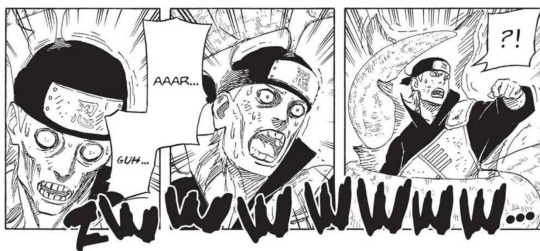
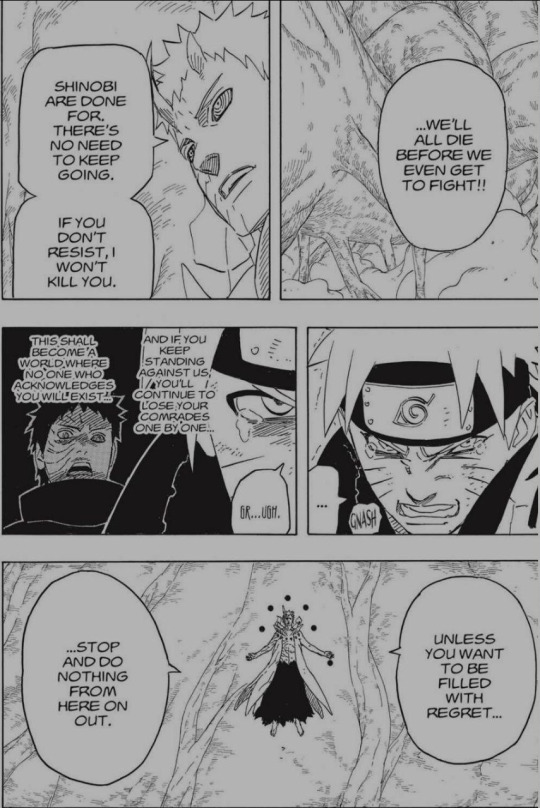
For context, Obito activates the Divine Tree that kills a bunch of shinobi after instantly sucking away their chakra. And then he has the audacity to say that shit while everyone's watching how Mr. Genocide turns their comrades into husks. And if you think that, well, this is just some randos, they are here to raise the stakes of this endless battle, but no, Shikamaru also almost gets sent into the afterlife while Obito is preaching "if you stop fighting, I won't kill you". Just what an awesome guy.
But I got off track, back to the reply. Post 599 Kishimoto goes fucking ham on the parallels between Naruto and Obito... especially the ones that weren't even there. Because he is perfectly aware that even with the whole delulu savior shit that Naruto gets by using talk-no-jutsu, if things are left as they were pre-599 (which pretty much includes only Kakashi Gaiden aka 239-244), Naruto HAS ZERO REASON not to cave Obito's skull in and drop this asshole's corpse somewhere in the nearest ditch. Kishimoto, starting with Obito's reveal, adds more and more shit for Naruto to latch on, because otherwise what we have is a protagonist who pretty much doesn't have any companions who didn't get their lives completely fucked over by Obito, not too mention that 99% of Naruto's suffering comes DIRECTLY from Obito's actions.
So let's look at these GREAT parallels, which, thankfully, Kishimoto decided to put out in one monologue of Naruto's in chapter 653
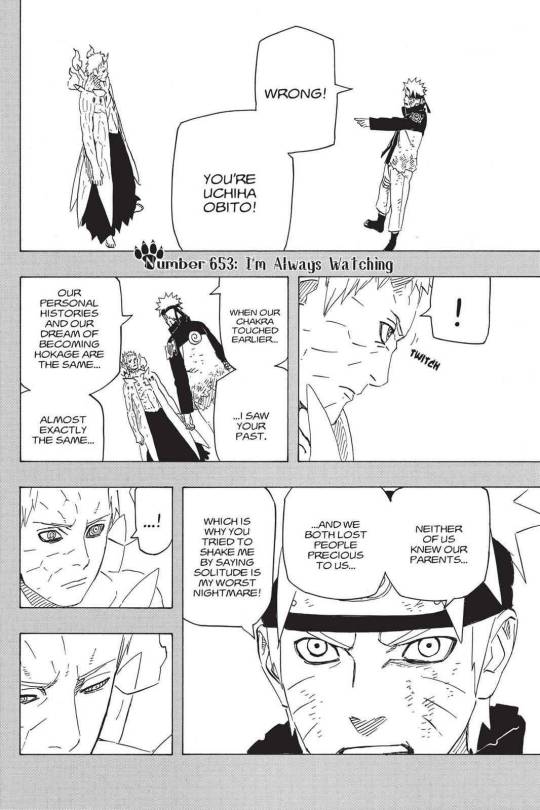
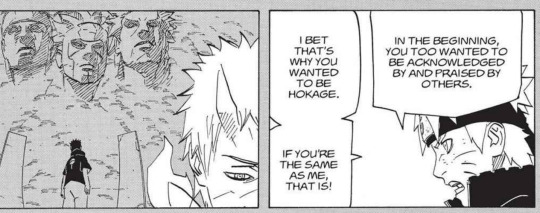
neither knew their parents
correct, but a very simple a short question from me🥰so who is the reason for Naruto never knowing who his parents were? Who was such a meanie to take away Naruto's family? Who put fucking bombs on him 5 minutes after his birth?
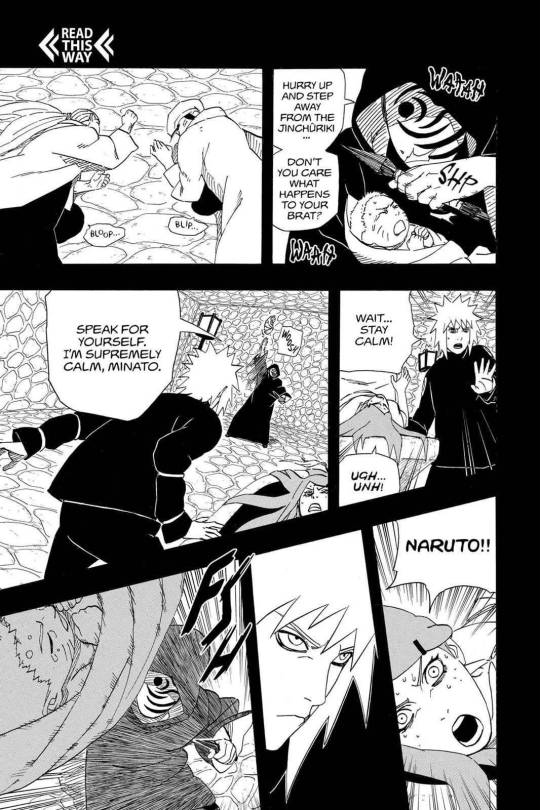
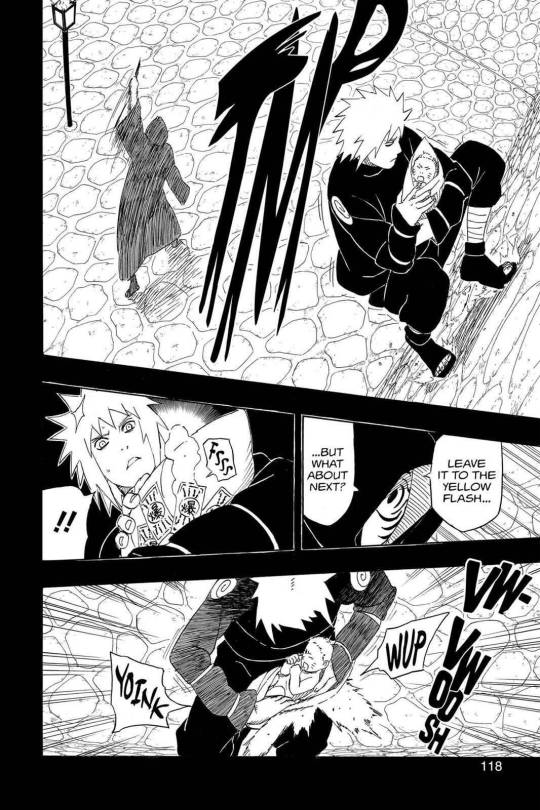
(chapter 501)
Oh, right. The poow liwwle baby boi who only had Rin as his light and just dreamed about becoming Hokage.
I will go off track again, because the manga itself brings it up, but it's another important thing that Kishimoto wishes his readers to lobotomize themselves about: the timeline
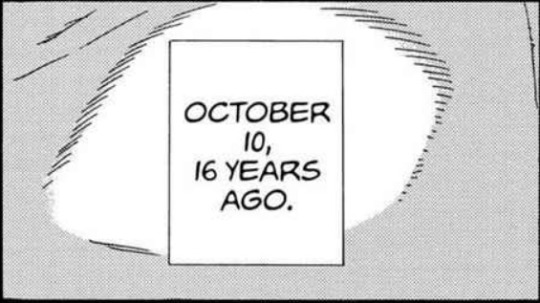
The murder of Kushina, the resulting death of Minato and the destruction of Konohagakure all happened 16 years before the events of Shippuden. For the sake of simplicity, Shippuden will be set in year 80 (after Konoha's foundation), so the attack took place in year 64.
Obito is 30 (I have seen that he is sometimes supposed to be 31, but 30 is easier on the shaky lore of Naruto) in Shippuden. The Kannabi bridge mission was supposed to be around the same age that team 7 had in OG Naruto - 12-13. So Kannabi happened in year 62-63. Meaning, that IN BEST CASE SCENARIO between Obito waking up at Madara's and
1) murder of his teacher's wife 2) battle to death with his teacher 3) murder of his classmate's mother (the woman that Obito kills before taking Naruto? Sarutobi Biwako, Hiruzen's wife. And Hiruzen is Asuma's father) 4) large-scale destruction of the village he, supposedly, wanted to become a Hokage of
is at best A YEAR, if not just a few months. Because, again, Obito was recovering for some time, then the whole Rin's death scene, and then Madara trained him and explained him the plan. According to Obito's flashback in 600s, Madara kills himself by plugging himself off the Hashirama life support, and only after that Obito starts the whole grooming Nagato for the plan and attacks Konoha.
I point this out because I have seen numerous times how the defenders of poow liwwle boi Obito try to deflect the blame for Obito's actions by claiming that Madara made him do this. Madara WAS DEAD during all of this shitshow. Moreover, as you will see later in this post, Obito repeatedly does things that are NOT aligned with the whole ideal world creation and salvation for everyone, moreover, they oftentimes CONFLICT with this plan, and just outright scream I AM A PSYCHO WHO WANTS TO COMMIT MASS MURDER FOR SHITS AND GIGGLES
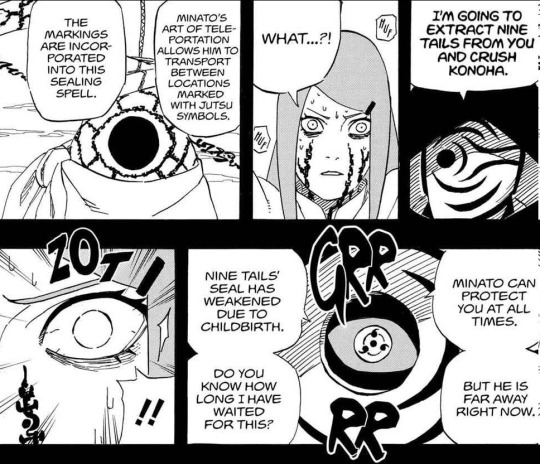
First of all, yes, let's admire how righteous and totally not maniacal Obito looks at the moment. "Do you know how long I have waited for this" MY ASS SHUT UP you're a cringe 14 year old. Secondly, let's hear out his wonderful plan, which is "gonna extract Nine-Tails, gotta crush Konoha". And while the first point does correlate with Eye of the Moon - they need the Tailed Beasts, after all - but then in Obito's flashbacks we learn THAT NAGATO WAS NOT ON HIS SIDE YET. THE GUY WHO CAN CONTROL GEDO MAZO AND STORE THE TAILED BEASTS IS STILL NOT WORKING WITH THEM. WHY THE FUCK ARE YOU ATTEMPTING TO STEAL NINE-TAILS THEN?? WHERE ARE YOU GOING TO PUT HIM??? Oh, maybe Obito kept a close eye on Kushina and realized that she was soon gonna give birth, which would be the primary opportunity to yoink Kurama? WRONG. OBITO BY SOME SHEER COINCIDENCE OVERHEARS KAKASHI TALKING ABOUT THIS OVER RIN'S GRAVE. HE THEN PROCEEDED TO KNOCK OVER THE FLOWERS ON HER GRAVE AND THEN ATTACKS KONOHA. HOW THE FUCK IS IT HELPING WITH THE PLAN???? YOU'RE JUST GIVING THEM 29847238 OPPORTUNITIES TO RECAPTURE THE THING????? YOU'RE ATTRACTING THE WORLD'S ATTENTION TO THE FACT THAT SOMEONE'S OUT THERE TRYING TO GET THEIR HANDS ON THE TAILED BEASTS??????
So, obviously, there is zero rationale for Nine-Tails' attack from the plan perspective. Well, maybe it alings with Obito's ideals, whatever the fuck they are? Obviously, glasses Obito would never do anything like WIPING OFF HIS AND HIS FRIENDS' HOMES OFF THE MAP and kill his dear sensei's FAMILY. MOREOVER, Rin fucking DIES trying to prevent Isobu from being unleashed on Konoha and decimating it, so what does our poow liwwle lover boi does? That's right, he pulls out Kurama and decimates the village only a some months after Rin died trying to protect it from the very same thing happening. Oh, wait, Kishi, so did she see that while in Pure Lands or not? Or does she have selective vision?
And mask Obito can be rationalized to do this by saying "oh, he's just showing the people the DeSpAIr", but again, this contradicts the manga with Obito saying "I don't care about this world yada yada", there is nobody who exactly would become targets for this campaign (Obito's endless speeches in 599 onwards are aimed at Kakashi/Naruto/etc) because we just see Obito interacting with Minato and Kushina, which would become despaired off the simple fact that Kushina is getting murdered by someone extracting the Tailed Beast, the village being crushed is just something on top that literally endangers his little precious plan more than it achieves anything. Is Obito ever shown to regret this as a stupid stunt or as act of terrorism against the village he supposedly love? NAHHHH WE CAN THROW IN OUR 20TH RIN FLASHBACK
Oh, and the timeline thing is important for another reason: poow liwwle boi defenders like to say that Obito went through so much and had witnessed the DarKneSS of the shinobi system, which is the reasoning for him going crazy and attacking Konoha. Obviously, this is bullshit, because the poow liwwle baby boi had no time to see anything about the grander shinobi system, he had been with Madara for several months with Madara being mildly ominous in the background and saying the most vague evil shit imaginable (before Obito runs off for Rin and Kakashi, he is still believer in the power of friendship and such, and the manga shows them having a whole wooping 1 conversation), then he witnessed Rin die, instantly became evil and commited a massacre (so much for cutie patootie liwwle boi), and then goes off to learn the plan from Madara and train to become as powerful as he is during Obito vs Minato. Even if I ignore the shitty writing that is supposed to suggest that Obito HAS ALL OF THESE IMPORTANT REALIZATIONS outside of the main plot, the timeline simply affords no place for him to comprehend the evils of the shinobi system. So yes, Obito is literally going off his anger over Rin dying and something something Minato being on another mission something something Kakashi (because there is two versions of the things Kakashi did that Obito is supposed to see, but Kishimoto conviniently shoves that little problem under the rug, god forbid we have any actual emotional interaction from Obito's character that doesn't involve the whole lazy Rin bullshit).
So, we are just on our first simularity between Obito and Naruto, and we already see that Obito's poow traumatized baby boi narrative falls apart when we decide not to go for the lobotomy Kishimoto wants, but instead realize that a) Naruto should punch Obito's skull open for ever mentioning his parents b) Obito is a mass murdering maniac with zero excuses and zero remorse
so let's continue with the parallels, shall we?
had it tough at the Academy
Now you're simply projecting Naruto's issues onto Obito. We have exactly two pages of Obito in the Academy years, and they are from chapter 599
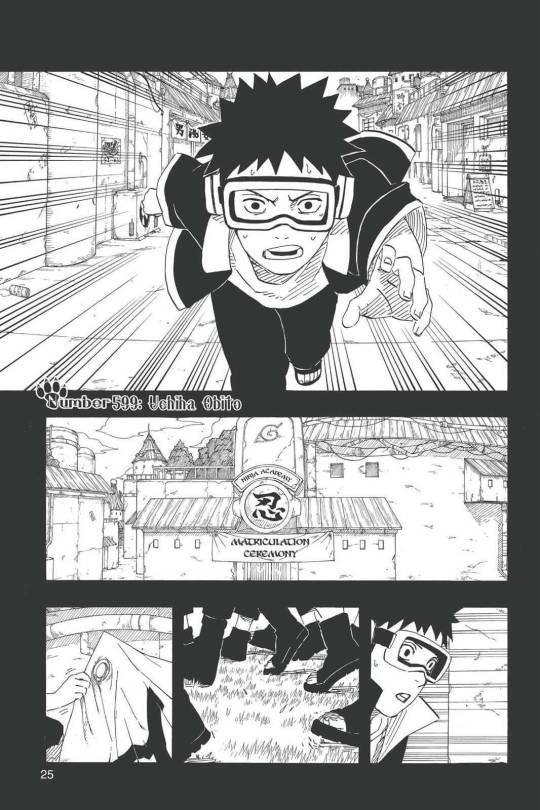
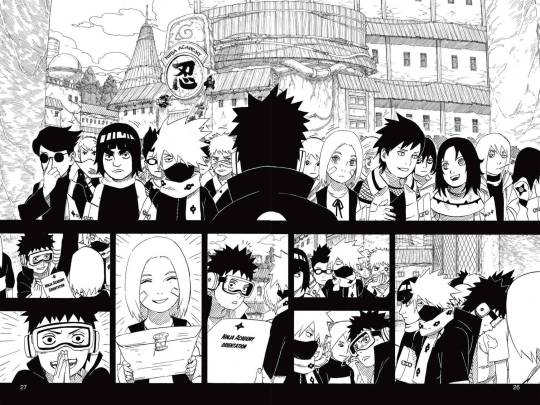
And the thing that you are claiming as "him having it tough in the Academy" is.... him arriving late at the entrace ceremony in the Academy, Kakashi sighing at him, others kids just going back home, and Rin bringing him his entrance papers. Sorry, who is giving him a tough time here? Kakashi sighing? Kids who likely meet him for the first time not interacting with him? The Academy not waiting with finishing the ceremony because one kid is late?
Yes, this scene does show Rin being nice to him, but nothing more than that. I am not sure how old exactly the kids are in this scene, but considering Kakashi would graduate at 5, I would say that it's about 4 years old? Obito would go on to graduate at 9. A five whole wooping years that are completely not covered by this first scene.
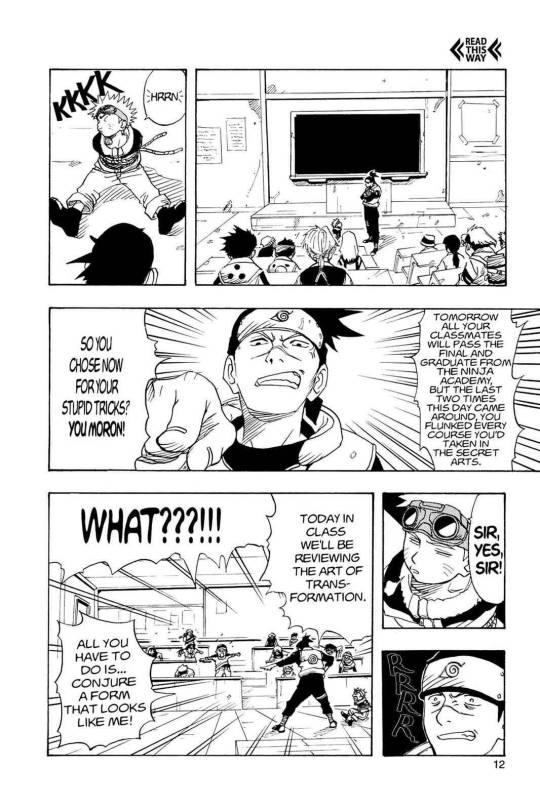
(chapter 1)
And coming back to Naruto's issues at the Academy - Naruto was a delinquent that drew poop on the Hokages' faces AND he failed the graduation exam two times already, meaning that by 12 years old he got held back quiet a bit. He also has this little problem called being a jinchuriki, of which most parents are aware, and explicitly tell their children to stay away from him.
Obito graduates at normal time (9 years), similarly to Rin, Kurenai and Asuma. The only outliers would be Kakashi and Gai, both of whom would become two of the strongest ninja in their entire generation. Obito didn't cause trouble, in fact, it's repeatedly said that he helped the elderly around (and according to his own words even KNEW all of old people in Konoha when he meets Madara). Nobody in the village is ever stated to have anything against Obito, he's just an orphan from the Uchiha clan.
Literally nothing suggests that Obito had it tough in the Academy
disliked by a lot of people
Again, there is little confirmation of that in the manga.
Does his clan hate him? If so, why? There is no confirmation of this, moreover, Kishimoto keeps Obito's plot line and Uchiha's so apart it's actually absurd, but nothing in the story suggests that they should hate him or even simply not care for him. This is again in contrast to Naruto's own parents, because his Namikaze lineage was hidden (regardless if there were even relatives who could have taken care of him) and Uzumaki clan was decimated some time during the Third Shinobi World War, scattering the small amount of remaining members across the globe.
Do the villagers hate him? If so, why? There's also no evidence of that, on contrary, he was very friendly and helpful to the elderly around the village, so it would not be strange if a few of them were looking out for Obito. Obito has an annoying habit of coming late and being a bit of crybaby, but that wouldn't be enough to make the villagers dislike him. Unlike Naruto who is the vessel of the nuke that ravaged the village just 12 years before he learned of the reasons behind his mistreatment by the village.
Do his classmates hate him? Again, nothing is known about his Academy years except for one singular scene where he just meets them, but 599 also shows us some more interactions between him and the other kids in his generation... during the chunin exam
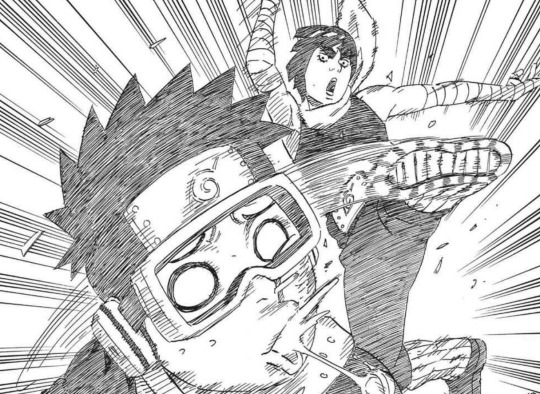

Do I even need to comment on how this is not anyone disliking him? This is just how competition goes.
Oh, and there's also a bunch of other minor things in this chapter, but I think it's a good time as any to introduce them😇

This. scene. right. here. It pisses me off to no end. You wanna know why?
Because this is the FIRST time we get Obito's Hokage's bullshit.
That's right, you aren't mistaken. The original Obito introduced to us in Kakashi Gaiden (239-244) NEVER EVER states that he dreams about becoming Hokage. He says stuff about how shinobi should act, he says how he's gonna become strong and tough once he awakens his Sharingan, he says how he is gonna protect Rin and others, he says how he is gonna see the future with the eye he gave Kakashi, etc etc. BUT NOT A SINGULAR MENTION OF HOKAGE BULLSHIT.
Kishimoto, for some mysterious reason, never introduced this CORE part of Obito's character (to the point Naruto literally yaps about JUST IT when he enters Obito's inner world thanks to the power of plot) when writing the original Obito, but the moment he needed to do the whole reveal thing and the shitty redemption arc in 30 or so chapters for a guy who's been our main villain for almost 300 chapters - oh hell yeah in 599 Obito gets the same fucking dream as Naruto, because otherwise Naruto has 0.0000001 reasons not to beat up this piece of shit. So, again, FUCK YOU, Kishimoto.
Right, what I was on about? Ah, Obito's classmates. So there's a bunch of other scene where Obito - HOLY FUCKING SHIT - is seen with someone other than Rin, Kakashi and Minato (very deep character, am I right)
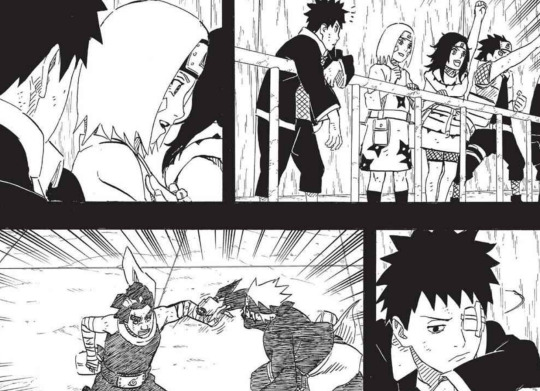
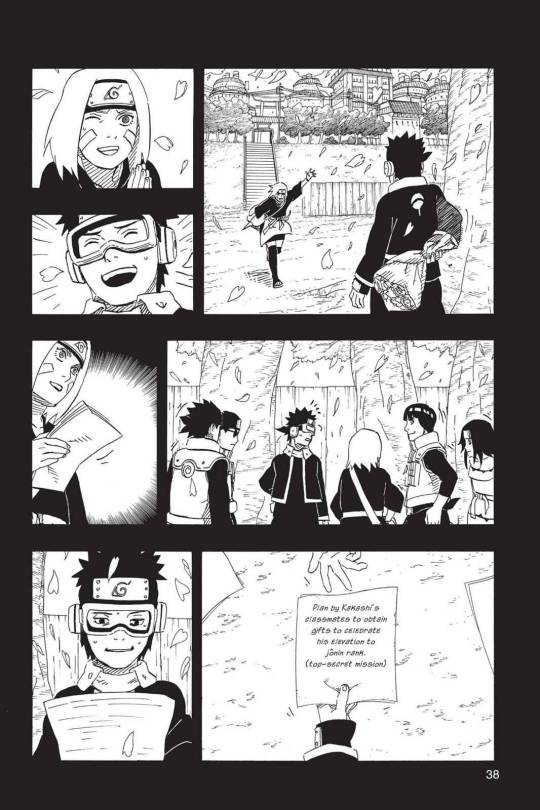
And it's literally Obito being focused on Rin cheering Kakashi on (you know, THEIR TEAMMATE), so no interaction between the gang and him, and then later when we see them all planning gifts for Kakashi (who became a jonin at 13, A BIG FUCKING THING) while Obito is flustered because he was planning on confessing to Rin at that moment.
So, literally, the only person amongst his classmates who openly disliked him was Kakashi, who had a damn stick up his ass and wasn't really friendly to anyone (which we can see with how pretty cold to Rin and Gai he was at the time). And, of course, because we are dealing with Kishimoto, 239-244 Kakashi is a much bigger asshole than kid Kakashi in flashbacks post 599. Like, the OG Kakashi actually bullied Obito for his weakness, while the later one was mildly irritated at Obito's habits and carefree attitude.
So, in total: nothing suggests Obito was disliked by his family, by his village or by his classmates, except for Kakashi, who was just an asshole at the time, and his assholery varies depending on what Kishimoto needs for the plot to be.
Oh, and since we are on the topic of classmates: another magical lobotomy that Kishimoto expects the readers to have is for everyone to magically assume that never ever in his entire life Obito had friends EXCEPT for Rin. And I guess Kakashi for those 2 minutes before Kakko dropped that cave on their heads. Which, again, HAS NO BASIS in what Kishimoto actually shows us. Yes, Rin was the first person to support him, but he has known other classmates for almost 10 years before Kannabi happened, yet the plot acts like there were 0 interactions between him and others, which is... not how children fucking work? I can understand Obito feeling lonely because his parents are gone, yes, but then Kishimoto slam dunks on the readers' heads that UHM AKTUALLY NO ONE FROM HIS EXTENDED FAMILY CARED FOR HIM AND UHM AKTUALLY HE HAD NO FRIENDS EXCEPT FOR THOSE IN HIS GOVERNMENT ASSIGNED TEAM AND NO ONE FROM THE VILLAGE LOVED HIM which is a lot of stuff to shove down people's throats without giving a proper reason for this. People knew that Naruto was a jinchuriki, so they stayed away from him, Sasuke was extremely traumatized by the Uchiha massacre, yet we are magically supposed to believe that Obito falls into the same category????
(also let's also mention who is responsible for Naruto's and Sasuke's loneliness... ah right, Nine-Tails crush and the Uchiha massacre, both of which were fully or partially Obito's doing🥰)
Which is why this
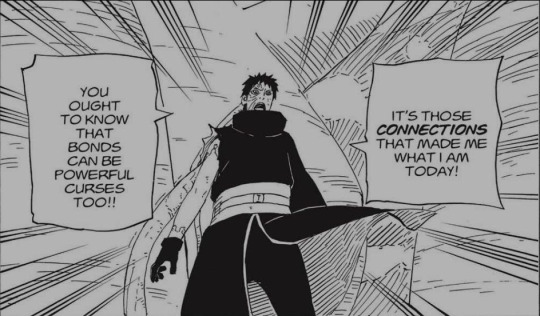
(chapter 616)
scene is SO fucking funny even without the whole "Obito goes full angwy babyman and starts stomping his feet and screaming YEAH LOOK AT ME LOOOOOK I AM MAD AND ANGRY AND DEPRESSED BECAUSE I HAD FRIENDS SO YOU SHOULD BE MAD ANGRY AND DEPRESSED TOO while the rest of the Alliance is scrambling to survive and grandpa Madara is chilling in the background" because no you had NO connections??? Kishimoto is desperate to peddle us that bullshit about "Rin was the only person in Obito's life (for reasons I will not be explaining because I NEED this shitty redeption arc to kick off)" and regularly manages to forget that "Connections" imply number more than one, and Obito as he is given in canon at best has TWO, 1 for Rin who is a plot device and 0.5 for Kakashi and Minato respectively. And he is insistent on "Rin was my only light yada yada"... until Kishimoto suddenly no longer needs it
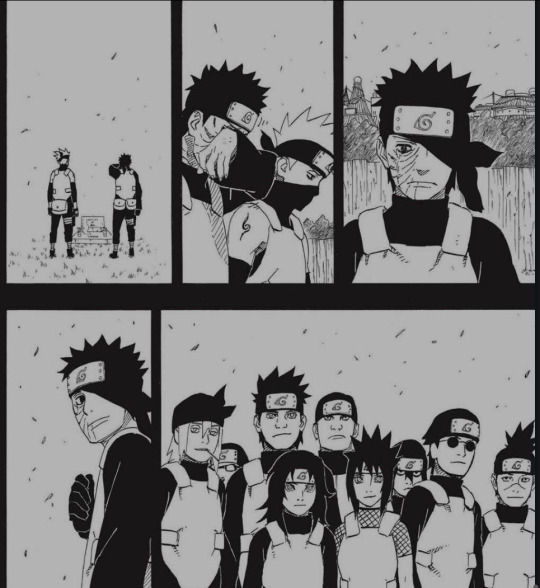
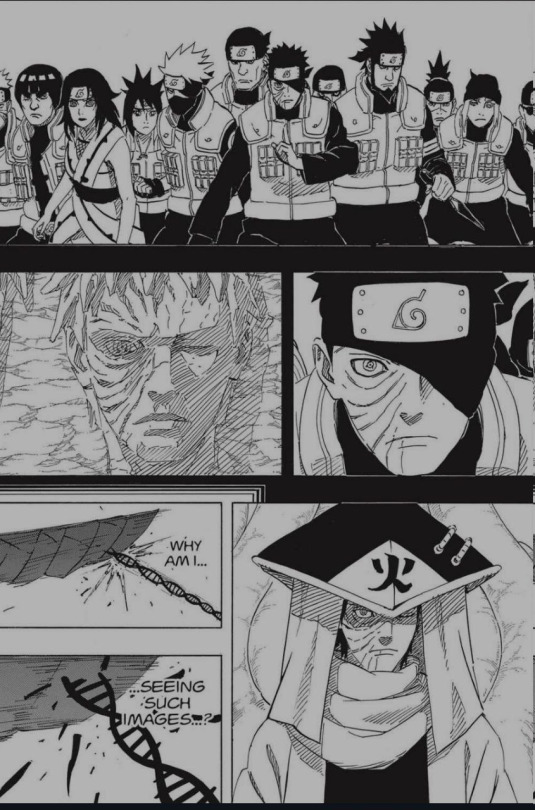
(chapter 651)
As a writer I am honestly amazed at sheer bullshitery and audacity of this scene. Kishimoto literally makes the plot gaslight Obito into "Hokage comrades Konoha good Hokage comrades Konoha good Hokage comrades Konoha good". Mind you, the Hokage thing was introduced literally during the masked man reveal, Obito had NO connections to speak of with his classmates because Kishimoto was SHOVING the idea of Rin being super special to him THAT HARD, he didn't give shit about any of these people for 16 FUCKING YEARS (!), Asuma is DEAD because of the merry band of terrorist that OBITO CONTROLLED (and that's after murdering his mother), Kurenai is raising Asuma's child ALONE, and IRUKA LITERALLY DOESN'T EVEN FUCKING BELONG IN THE SAME GENERATION AS THEM???? HE BECOMES GENIN IN THE SAME YEAR NINE-TAILS ATTACKS KONOHA???? OH YEAH, OBITO ALSO MURDER IRUKA'S PARENTS WITH THE NINE-TAILS INCIDENT????? WHAT THE ACTUAL FUCK KISHIMOTO? WHAT IS IRUKA DOING HERE IN THIS BASTARD'S BULLSHIT FANTASY??????? ALSO IRUKA GETS THE SCAR DURING THE NINE-TAILS INCIDENT???????????? WHAT THE FUCK???????????????
Okay, I am taking deep breaths because I am feeling like I am about to lose my damn mind. But hopefully my argument about "Obito very much wants to be a complex character, but the plot has him be 1.5 dimensional one by ignoring 90% of what Obito did and does in the manga" becomes clearer. Obito's connections come and go as Kishimoto wants them, not because they organically come from the plot, and lack of said connections is never explained, which is why I honestly don't blame people for calling Obito obsessed with Rin, because Kishimoto does desperately tells us that no, Obito didn't pull these 16 years of mass murders because of Rin, there was a higher cause... but then fails to show us anything coherent outside of endless repetition of Rin, Rin, Rin
technically an outlier
And I fully agree with this, because at least that is directly stated in the manga
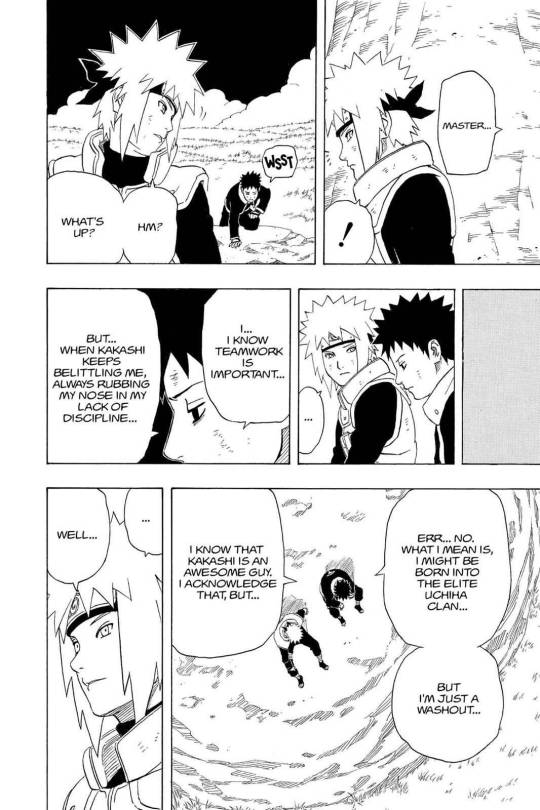
(chapter 240)
The only thing I think I might add to this is, I believe, during Sasuke's first flashbacks to his family, he and Itachi actually discussed the age of awakening the Sharingan, and I think they mention that 8 is about the time most people should have it? Which would indeed place Obito quite behind as he awakens it at 13, but considering the fact that it requries the user to get traumatized, is it really a bad thing? Lmao, I guess it's just teenage boys' dreams that I don't get
However, Obito never had an older mentor growing up, whereas Naruto did (that would be Iruka)
That really depends on what you consider "growing up". I can't say with exact certanty at what point Iruka became actively invested in Naruto's life (because Kishimoto kept rewriting things + this stuff is pretty vague at where I am looking for it, meaning chapter 1, Iruka is interested in Naruto's fate because both of them are orphans, so no exact indication when did it start. but. huh. I wonder who's fault for the two of them being orphans is that), but we do know that Obito graduated from the Academy at 9, meaning about 4 years he had a mentor in Minato, so his early teenage years are covered. Nothing exactly certain about the period before that, but yeah, sure, let's agree that implicitly the plot suggest a lack of mentor for Obito's childhood.
But another thing that, I believe, should be brought up, is the start of the Third Shinobi World War. I don't wanna repeat the lecture about establishing this date, but basically the beginning of it would be right around when Obito was 8, so yes, the general political situation had significantly worsened, and Obito would have probably started feeling the effects of the war enveloping the world, but Obito soon gains an older guiding figure.
Because neither of them had their families, Naruto was lucky that he had Iruka. Iruka provided that big brother figure, the mentor and in some ways a caring environment for Naruto, despite the hardships. Obito, however, did not receive any of this.
Naruto still lived alone in the state-provided flat with mountains of trash and ate ramen with expired milk, something to this extent. This is not to mention the villagers actively shunning him for being the vessel for Nine-Tails. Obito, meanwhile, is not confirmed to have these hardships in the plot, moreover, as I have explained, a lot of the things you mentioned are assumptions that clash with what is seen in canon. Unless, of course, we are putting Obito's perspective above all, and Rin and the others cheering Kakashi and Gai fighting while ignoring Obito is literally the worst thing ever, but this is straight up offensive to Naruto's experiences.
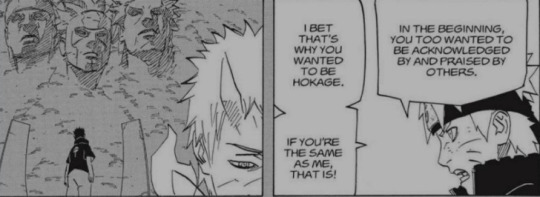
And also while we are on this topic let's return to Naruto's talk-no-jutsu here, yeah, the same one he had after the plot magically had Naruto learn Obito's memories, specifically the ones pre-Nagato grooming, pre-Konoha destruction, pre-Kushina murder, pre-overtaking Akatsuki, pre-overtaking Kirigakure, pre-Uchiha massacre, pre-Akatsuki jinchuriki hunt, pre-Sasuke grooming, pre-Konan's murder. Which. Wow. How convenient, Kishimoto.
So Naruto here explicitly says that OMG U R JUST LIKE ME FR when it comes to the Hokage dream (that Obito gains upon the masked man reveal as far as the narrative is concerned)... only he is literally pulling this out of his ass, because, again, if Naruto was not introduced to some new memories the readers didn't see, there is nothing suggesting Naruto's claim. This entire thing hinges on readers taking the lobotomy pill and ignoring the giant extended family Obito had + the elderly in the village and not asking for an explanation as to why Obito would feel this extreme loneliness that would require latching onto Rin that strongly. I can agree with "lonely because parents gone", but beyond that this is just Naruto using the power of plot to fix Obito's worldviews.
What Obito did have, was Rin. The two have been childhood friends for a very long time. Rin gave Obito that sense of security and attachment, despite them being the same age.
This is all very lovely and dandy, but you would need to find me a scene showing them being childhood friends. For this post I have reread all chapters starting from 599 and to about 660(?) where I gave up because the conversation between defeated Obito, Kakashi and Minato was causing me to overdose on cringe. And during this entire period the only memory that anyone had of the two of them being children is that Academy arrival scene. THAT'S IT.
Then we have the team Minato introduction scene, but it's obviously after they become genins, so 9 years old. There's also this scene:
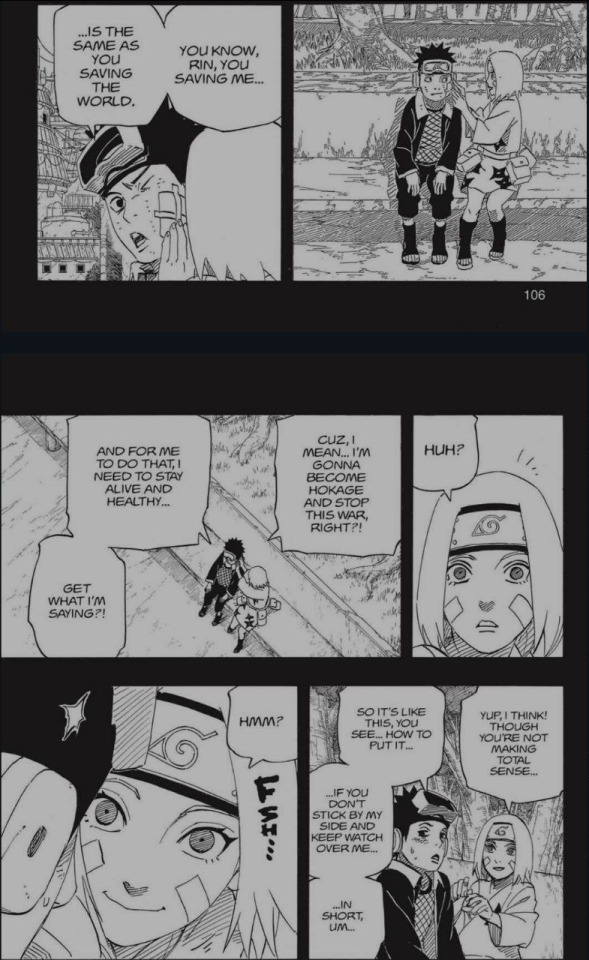
But if you check the earlier screenshots, you will actually realize that Rin is wearing the kimono that she has during the chunin exam + she has Konoha's headband, so they are already about 10 years old (at 9 they graduated the Academy, at 11 they became chunins, but Obito didn't pass this particular exam). So the kids you are claiming to be such good childhood friends with Rin being the sole pillar of emotional support for Obito have a giant 5 YEAR LONG GAP, and with Rin only living to 14 THAT IS A LOT OF TIME MISSING.
And in the other scenes Rin is already wearing her chunin get-up, so they are both 11+ years by that point. Meaning that as far as canon shows, Rin was nice to him that one time during the Academy entrance ceremony when they were, like, 4, then we HAVE NOTHING until they become team Minato, and then we have an array of very similar scenes where Obito speaks about how he's gonna become Hokage and Rin looks pretty and nods along (an incredible show of personality, Kishimoto). And then we get to Kannabi where Rin seems as about as upset as Kakashi is, even if Obito, her supposedly best friend, GOT CRUSHED ALIVE and is begging her to get his eye out of his eye socket and shove it into Kakashi's still untreated wound. And Kakashi, as we know, didn't get along really well with Obito until like 15 minutes ago.
But then Rin does the single most psychotic thing imaginable: Obito gets finally crushed, her supposed best friend's body turns into tomato paste that they can't even pick up and will have to leave him behind on the enemy territory, and as Kakashi explains how Obito loved Rin and died for her, the girl opens her MOUTH AND STARTS CONFESSING TO KAKASHI.
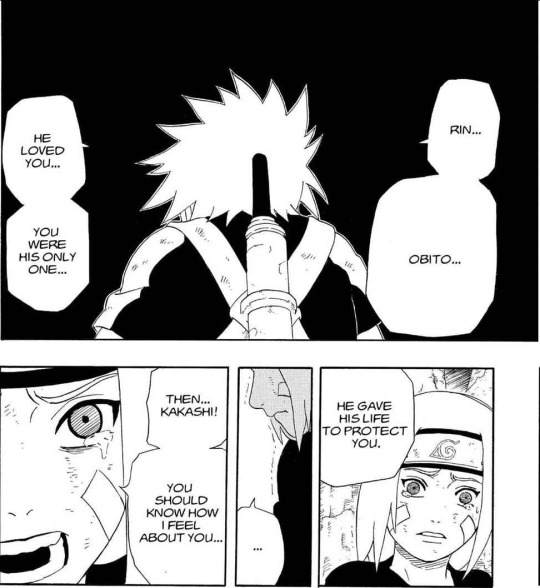
DARLING CAN YOU WAIT LITERALLY LIKE 5 MINUTES BEFORE ANNOUNCING THAT? ZETSUS DRAGGING AWAY OBITO'S HALF-DEAD BODY CAN PROBABLY HEAR YOU THROUGH THE ROCKS. WHAT THE ACTUAL FUCK, HE JUST DIED!
And, I understand, in Kishimoto's mind this is all probably very romantic and tragic, but to me this is just another example of Rin's character flipfloping between the cutesy innocent girl in team Minato and the single biggest psychopath known to Konoha in her generation and this is only because Obito's turn to dark side happened outside of Konoha.
So, in total: one interaction as children, numerous interactions in team Minato, but it's literally the same one with them doing the same things, and then the Kannabi bridge. I am sorry, but this is one of the worst executions of childhood friends I have ever seen, if they are supposed to be that way. And on THIS + Rin's flipfloping character that gains and loses cutesy girl characteristics depending on Kishimoto's mood is on what Obito's entire fucking arc hinges. Obito who would be by far the most prolific war criminal in the last 20 or so years of shinobi history😁
One final thing before moving on: it's actually the pictures that you mention later in your post
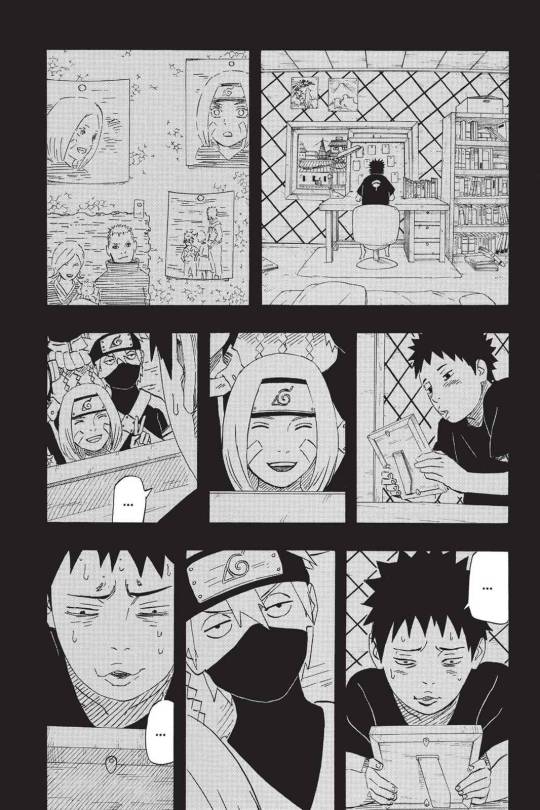
I don't really care if Obito is here trying to kiss a picture, he's a young boy, he does silly things. What I wanna point out is the pictures that Obito has, because to me they are VERY telling.
Kishimoto shows us 0 photos of Rin and Obito together, you know, the supposed childhood friends. The picture that he is trying to kiss is the one that they took as team Minato at 9 years old. He has a picture of his parents (thank god for Obito's mama cuz dad is giving 0 pretty genes lol), and then he has a bunch of Rin pictures, but the angle on them all is just off, like he is sneaking photos of her from far away, or when she doesn't expect that, or as if he is sitting in the bushes. All of them indicate very little closeness, like they haven't been, you know, childhood friends for years and did things together. Kishimoto gives them practically no mementos that would indicate that degree of closeness that the whole "RIN WAS MY SOLE LIGHT" thing is trying to convey, but god does he not save up on the scenes of Rin putting bandages on Obito.
Obito’s love for Rin transcended romance. Of course the romance was the overt part, but his love for her was his sense of security. She was his safe space. When a child grows up without love or care from a parenting figure or a mentor, they will find ways to cope and latch onto the closest thing they can find safety and comfort in. Rin took on this role. So when Rin was killed before him, naturally there would be a sense of deep despair and anger.
I will not be adressing the first half of this, because I believe I have made it very clear that Obito's attachement issues are very overblown with what is given within canon (unless, of course, we go into the whole Uchiha love/hate/curse bullshit, but to me it's Kishimoto's favorite crutch to fall on whenever the plot demands to know why the fuck is everyone tolerating Uchiha #13 yapping and doesn't call them out on their bullshit) and his friendship with Rin is shown very weakly, to the point I would say most of it is left to readers' imagination. That's wonderful that you found a ship that has this sort of transcended love vibe, but what I see is two characters literally strung together by the author for no other reason because mangaka needs that drama, one of these characters barely qualifies for a character and is moreso a plot device, while the other one COMMITS SO many crimes the whole "she was my light" bitching and moaning can go into the trash pile along with the man saying these things, because hundreds of thousands are dead for the delusions of this one guy.
What I do wanna talk about is Rin's death, because GOD this shit drives me mad for numerous reasons.
Firstly, let's insert Kakashi into the conversation, because Kishimoto twists himself into a pretzel just to somehow both justify Obito's turn to the dark side and Kakashi not being an utter piece of shit that kills his friends for the mission (because Kakashi is a fan favorite I guess and making him fully responsible for that murder is a step too far). This pretzel is so lovely that it actually creates TWO versions of events in Obito as a witness and Kishimoto... does absolutely nothing with the change in Obito's perspective. Which is absolute insanity.
So, we turn off our omnipotence as readers, and sit inside Obito's mind as he sets off for Kakashi and Rin surrounded by Kirigakure shinobi in 603 (this is the only information he has). The Zetsus later mention some experiment of Kiri, Minato being on a different mission, etc, etc. Obito doesn't understand the full context, cuz he's running for his life, and at that point he does witness Rin's last moments through Kakashi's eye
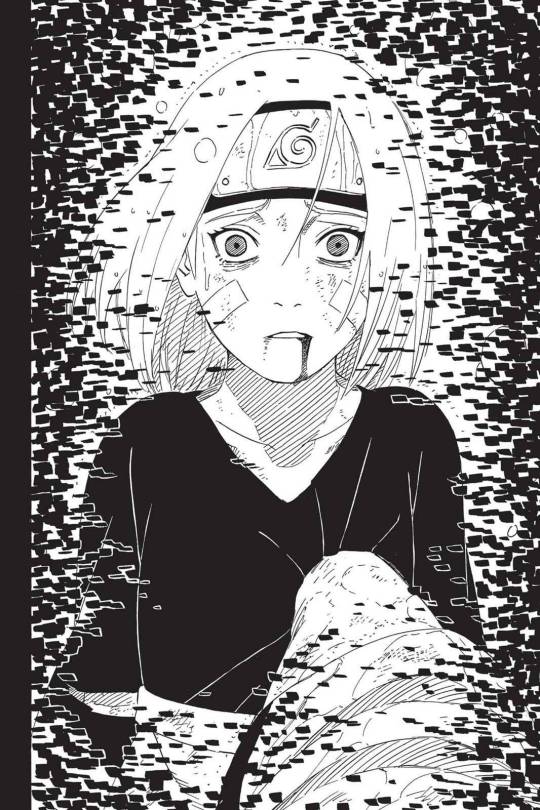
(chapter 604)
Huh, what an interesting expression Kishimoto chooses. Something in between betrayal, confusion and fear. Well, it wiil certainly correspond to what is actually going on, right? Right?
So Obito finally runs into the clearing and sees

Rin, standing still, looking scared and betrayed, while Kakashi pierces her heart, crying.
And so, Kishimoto in chapter 604 creates a pretty clear narrative: Kakashi and Rin were surrounded on a mission with Minato away, and, instead of protecting Rin like he promised Obito, Kakashi chose to put the mission above his teammate and killed Rin.
By chapter 605 Obito is already commiting the massacre of Kiri ninjas, who scream something about the importance of Rin's corpse, but ultimately no further context is given, so nothing much changes in Obito had witnessed on that day.
Wow, what a terrible thing to happen! Of course Obito would break and realize how terrible the system and by extention the world is, with Rin being killed for... oh wait, there's more?
And almost 25 FUCKING CHAPTER LATER we suddenly discover THAT THIS IS NOT AT ALL WHAT HAPPENED. And is it Kakashi who tells us his side of story? NO, OF FUCKING COURSE NOT, IT'S OBITO WHO DOES THIS. OBITO WHO'S ENTIRE FUCKING CHARACTER HINGES ON THIS ONE SCENE.
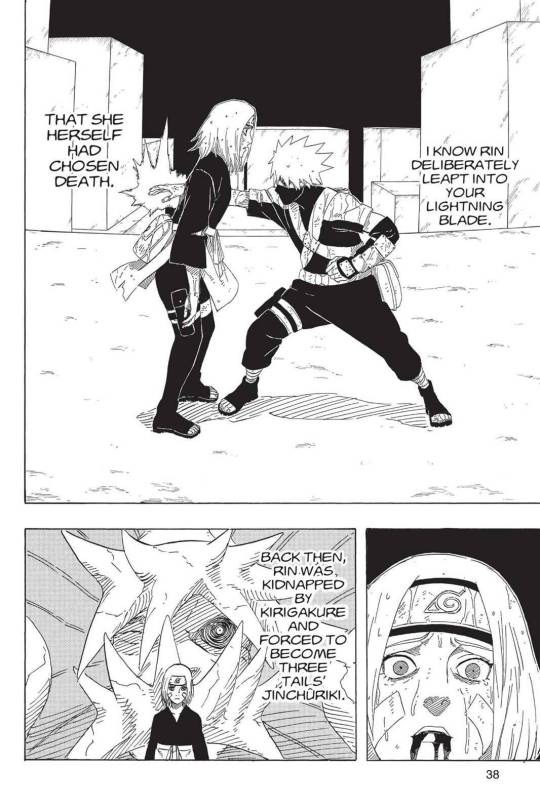
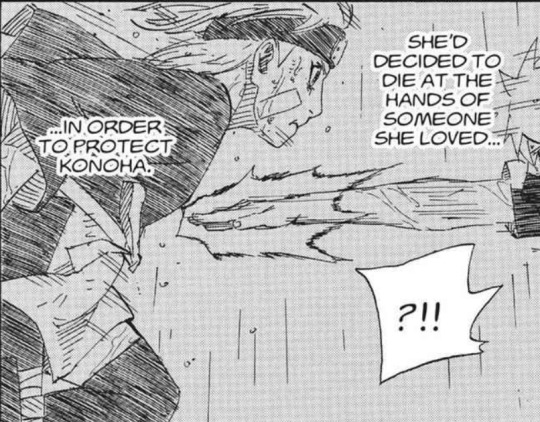
Rin did WHAT and was WHAT?
(I will not go into detail how Isobu being sealed in Rin COMPLETELY fucks over Blood Mist's timeline, that's a whole other separate rant)
So, A MASSIVE CHANGE OF PERSPECTIVE FOR OBITO: Rin chose this fate, Kakashi was doing everything in his power to prevent this, Rin somehow managed to gain enough speed and agility to overcome Kakashi's reflexes and THE FUCKING SHARINGAN to throw herself onto Kakashi's arm (yes, the very same girl who got abducted TWICE. I did mention her abilities flipflop depending on Kishimoto's mood), and Rin's death had a very certain meaning - to protect Konoha from being destroyed by a Tailed Beast.
(I also really love how Rin in 629 absolutely can not end up in the same pose she did in 604, thank you Kishimoto for your cheap manipulations)
So... this is a massive thing to happen. So how does Obito react to this upon learning? When does he learn this? How does this happen?
LOL. LMAO. FUCK YOU READER. (c) Kishimoto
Because it's just randomly shoved into the plot and ignored for the rest of the series, regardless of how it completely flips the relationships between team Minato, particularly with Kakashi no longer being an unfeeling traitor but rather someone who ended up in utterly terrible circumstances that he could not prevent and Rin... continuing her psychotic streak of "oh, Obito died? better confess Kakashi right above his still warm body" with "huh, I can't end myself, and I pose a danger to the village... well, I will certainly not entertain the possibility of finding my sensei's wife who knows all the most powerful sealing jutsu to keep the thing inside me in control, so suicide it is, and of course I won't go for any of the armed Kiri guys following us, I will do it using Kakashi, the boy I love. I am sure he will enjoy the image of me bleeding out on his arm for the rest of his life, especially with that promise that he gave to Obito". Another important thing that we learn that Rin REALLY loved her village, to the point of being ready to die for it.
And I will say what I think about this - you can not try to push the "cute innocent baby girl" narrative with SUCH a heavy decision done. This requires a lot a mental fortitude of someone much older and competent than the pure innocent light that Kishimoto tries to later portray her as.
But coming to the second point I wished to discuss and it is how Obito's entire interaction with the whole shinobi system completely crumbles with the change in these events, because the first version does show how messed up it is - Kakashi choosing the mission over a comrade, Rin's life being just a simple burden to the system, etc etc. But the second version of events OFFERS ABSOLUTELY NOTHING in regards to Obito's understanding of how wrong the system they are living is (contrary to LITERALLY any other antagonist in the series). Because Rin's death in the second version is a terrorist attack that Rin herself decides to prevent. You can have the most wonderful and humane system imaginable, with free healthcare, children being allowed to be children until growing into adutls, elections etc etc, and it would still not guarantee that people with nasty intentions from using power to inflict pain on innocents. And anybody could have ended up in Rin's place, if we are under assumption that Kiri simply wants to demolish Konoha with Isobu. The worst that could be extracted from this version of events is that Kakashi and Rin had to end up in this situation at all without adult supervision (which is moreso to Kakashi's part, because Rin in this scenario is just a bystander who got abducted to be used as a living bomb, and anyone from a cat to a granny could have been in her place), and Rin at 14 being able to make the decision to end her life for the sake of the village, but again this is also motivated by the actual danger she presents to the people around her.
All of the above is probably a good explanation as for why throught the entirety of 599 to 660s Obito can not formulate A SINGULAR good argument for the Eye of the Moon that would show the horror of the shinobi system except for "PEOPLE DIE - SAD", "PEOPLE BETRAY ALWAYS - ANGRY" and last but not least "YOU WILL BE JUST LIKE ME, GIVE ME A SECOND TO MURDER ANOTHER DOZEN OF YOUR COMRADES". I shit you not, the guy who was the one behind Blood Mist, witnessed the fate of Amegakure, was part of the Uchiha massacre, collected and personally knew members of Akatsuki, had been this amazing strategist and manipulator for the last 16 years CAN NOT say anything that wouldn't be about him being mad about Rin dying and how everyone's gonna be just like him fr.
The closest he ever gets to this is soon after Neji's death, remembering this wonderful thing called the cursed seal that the main branch of Hyuga would place on its cadet branch members regardless of their age whenever the current heir of the clan would turn 3, and this seal can also be used to inflict pain on the bearers by the people of the main branch. So essentially Konoha has a literal enslaving practices. Wonderful job, Hashirama. Well, what will our Savior and awesome guy will tell us about this practice?
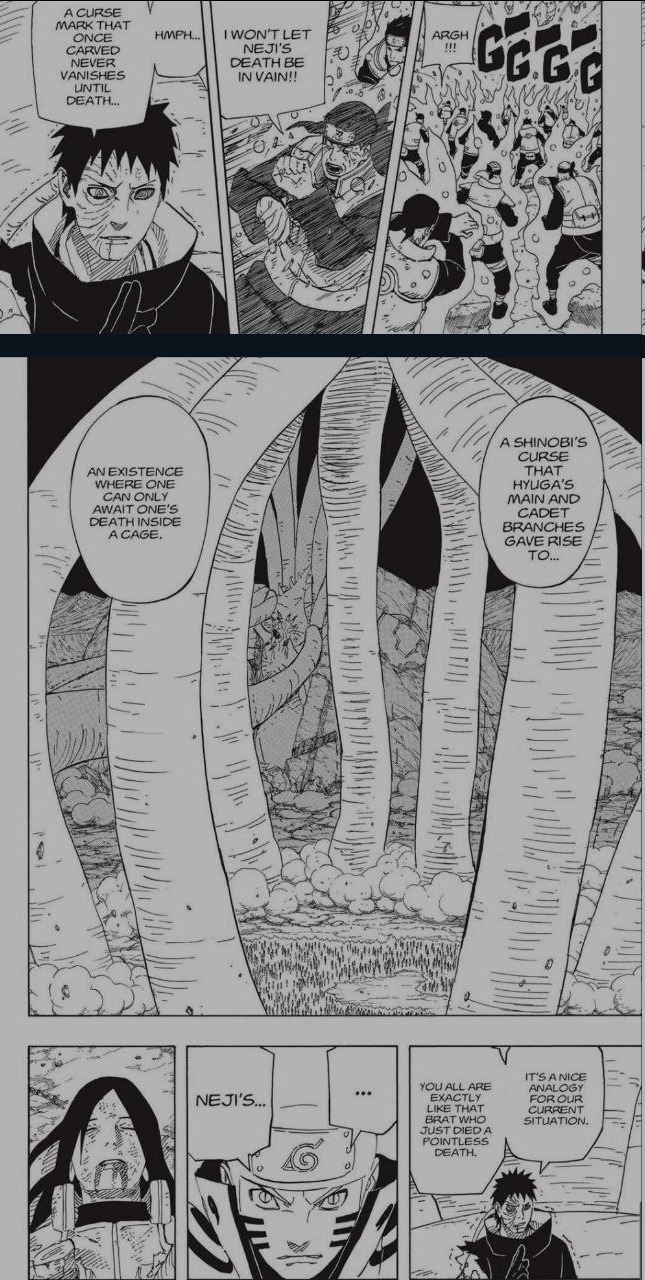
Ah, he completely missed the point of why enslaving your relatives is bad. AND he is using it as a shitty Twitter-level gotcha that would sound like "LITERALLY 1984!!!1!" without ever bothering to read the book. God canon Obito you're such a loser.
Which is why I really can just barely chuckle whenever I remember that as the apocalypse is unfolding, hundreds of thousands are dead, and Obito gives up on the plan of his life after Naruto talks-no-jutsus him twice, Madara dunks on this entire comedy opera and reveals that HEY IT WAS ACTUALLY ME BEHIND RIN'S DEATH! and most of Obito's post reveal yapping goes completely null because it wasn't the system's evil (the faults of which he is never shown to understand), it wasn't this world's evil, it was Madara's evil that killed Rin😁
And that's overall a good commentary on the final state of the affairs in Fourth Shinobi World War - the majority of people aren't suffering because the system, the majority of people are dying because there's two Uchiha assholes with their convoluted bullshit that are killing people en-masse for their delusions, one of which was dead for the last 16 years, so yeah, Obito ain't running away from the things he commited with "boo hoo Rin was my sole light" which is immediatelly followed by this
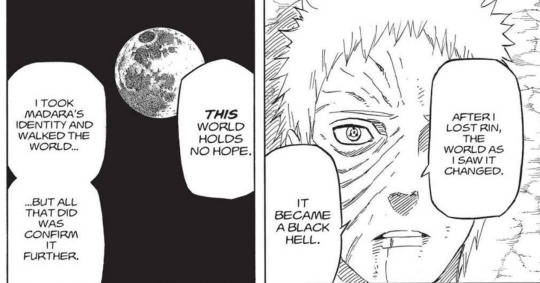
WHICH IS THE ONLY ACKNOWLEDGEMENT HE GIVES OF 16 YEARS THAT INVOLVED DEMOLISHING KONOHA THAT KILLED HUNDREDS, THE ENTIRE AKATSUKI THING THAT ENDED UP WITH ALL MEMBERS DEAD AND LIKELY THOUSANDS OF SHINOBI AND CIVILIANS MURDERED WHILE THE ORGANIZATION WAS ACTIVE, THE BLOOD FUCKING MIST THAT HAD KIDDIE MURDER EXAMS, DEATH SQUADS AND EVEN MASSACRES OF WIELDERS OF KEKKAI GENKAI, THE MASS MURDER OF HIS OWN CLAN, AND LAST BUT NOT LEAST THIS ENTIRE FUCKING WORLD WAR WHERE HALF OF THE ALLIANCE IS ALREADY DEAD, SO WE ARE SPEAKING ABOUT 50K CASUALTIES AT LEAST
buuuuuuuuut Riiiiiiiiiin waaaaaaas myyyyyyyy soleeeeeee liiiiight😭😭😭
(also I suppose this is how Kishimoto deals with the whole "so hey at what point does Obito actually see the problems of shinobi system" thing, which is. hilarious. a tiny panel with a moon on the background.)
Okay, rambling over, let's return to the original post
A lot of people would say: “but he had Minato,” “he had Kakashi,” “he had Kushina.”
I find it a bit weird that you chose to exclude Obito's grandmother for being a filler and an anime-original character, but included Kushina here, because I do not remember a single instance of her interacting with Team Minato that happened in the manga and not in anime/video games
but they only came into his life for a short period of time. Their interactions were not on an intense level as it was with he and Rin.
Minato was in Obito's life for 4 years as we previously established, which is a pretty big thing for Obito's total 14 year old lifespan. And I am still not sure of what interactions that Rin and Obito shared that weren't "she held his hand, put a bandage over his cut and said with a serious tone that he shouldn't hide his wounds". Like, it would have been funny and cute if we were talking about 13 year old Obito, but with corpses pilied up, half of the world destroyed and 30 year old Obito? Please give me something better than a placeholder cutscene, I am begging you.
And again, very little indication of their interactions outside of team Minato, so question mark to the whole "long period of time"
Naruto however, had Iruka, who most likely taught him a lot of things about the importance of the village, the importance of camaraderie, friendship
But... Naruto is learning it over the time we witness him in the plot. And it happens while we watch him at 12. So I am not sure where the "Iruka taught him" argument is coming from.
And Obito was certainly aware of the importantce of the village considering HOW MUCH dialogue is spent on him declaring how he is gonna become a Hokage. If he missed that point while having that dream, I can't even say anything. Also, Obito from 8 to 13 was in a militaristic settlement that was in the middle of a World War, I'm pretty sure their education wasn focusing on working up that patriotism in the kids that would soon go to the trenches.
Naruto had his fair share of trauma but he had support that allowed for some resiliency.
Gosh golly I wonder who was responsible for all that trau-- I am sorry, I will stop, you get the point.
And also, no. Kakashi was in his depression arc and didn't interact with Naruto until becoming his sensei, Jiraya was out there somewhere shitfaced and probably collecting intelligence for Konoha, Hiruzen was just creepily watching him through his magic ball without Naruto's knowledge, and with Iruka it's unclear at what point did he start feeding Naruto and chatting with him outside of classroom, and even if that started as soon as supposedly Rin and Obito became friends, Naruto still was being shunned by the majority of village and starts having proper friends only during the plot, so 12 years old and onwards.
(and, again, there is no reason for Obito to be left stranded by the rest of the society, nothing written by Kishimoto ever indicates this)
Psychological intermeshment stems from traumatic upbringing in childhood (lack of nurturance from an adult caregiver, abandonment etc), and then again from losing their sense of security/safety (Rin in this case).
I like your point, and it is kind of something of a new thing to me, but again, the entire scenario of Obito's abandonment and latching onto Rin is hinging on the reader making the decision to remove that part of brain that considers these characters somewhere other than the vacuum. It is plain and simple bad writing. I really wish I could agree with your point, but it would mean ignoring almost everything that Kishimoto showed (and I am sure that he was desperate to tell us something along your lines, but he utterly failed in that regard).
So he did what he could to get that sense of security back, even if what he did was questionable.
EXCUSE ME? QUESTIONABLE? QUESTIONABLE???
Several months after Rin's death, Obito kills hundreds in his own village for no apparent reason because the action brings his plan no benefit. Does that mean getting back the security? Obito also kills the mother of his own classmate, never showing regret for it, before proceeding to put a kunai against a newborns throat and booby trapping him. Was he getting back the security this way? Obito also manipulates the leaders of original Akatsuki into doing his bidding and when the plan doesn't work, gosh golly one of them dies in an internal strife, which seems just so terribly convenient for him. Is being a manipulative and lying bastard part of his security blanket? He then also proceeds to put the Fourth Mizukage under his genjutsu and what followed was one the most brutal regimes shinobi world ever knew. Did he felt safe and happy becoming the reason for an entire village's and likely country's suffering? Said regime also included mandatory battles between children of Academy age, so 8-10 years old, and death squads that would kill anyone attempting to desert said regime, and the only profit that Obito got for his plan from this entire affair was Kisame joining Akatsuki. Well, surely, that seems like a mildly questionable thing to get his sense of security back, hm?
I am not even gonna bothering continuing, but I can make this paragraph twice as large without much trouble. Obito was not simply doing questionable things, he was an absolute genocidal maniac, and very much had a tendency for opportunistic murder, and a lot of the things he did have no explained or apparent reason.
Then you have the complexity of the curse of hatred that intertwines the storyline, which make things even more complicated. But this curse was what pushed the storyline and placed Obito as an antagonist.
As I have already stated, a cheap copout from Kishimoto to not bother himself with writing anything more complicated than a story for first graders
He did not start a war because of a girl. He started a war because he was angry with the way the world functioned. How the countless wars kept ending lives and taking loved ones away from people. He did not want people to go through what he went through.
LMAO. So, obviously, yes, the favorite argument provided with Kishimoto's own heavy-handed writing: "I did not start a war over a girl. I will only mention her fifty times. And think of only her whevener something major will happen to me. Fuck those people that I met over the last 16 years and who ended up dead because of my actions or my plan. They don't matter, only the people I spoke with when I was 13 do. And I will not be able to provide anything of substance whenever an opportunity to talk about the faults of the system will arise. Just general throwing hands in the air and dramatic mumbling about despair."
And rereading the manga, it is actually apparent that he can't produce anything about the shinobi system (because Kishimoto never ended up giving him a moment to understand this, duh), so he consistenly attacks the world for things like people dying in general, which, if you ask me, is the point where any and all discussion with Obito should have ended, because he is clearly absolutely delusional and, similarly to the war that HE started, it is a conflict between the humanity as it is surviving or this guy's delusions entrapping everyone.
How the countless wars kept ending lives and taking loved ones away from people. He did not want people to go through what he went through.
Damn, nothing says "I hate wars" like creating and controlling an international terrorist organization that specializes on taking the war business and spends YEARS doing random side-quests for money when your own plan has zero need for money, so you pretty much allow these bloodthirsty assholes to run amock. Nothing says "I hate wars" like sending said assholes into highly-populated areas to catch the jinchuriki when you are shown repeatedly to have the abilities to do so quickly and effiently, but nope, let's nuke Sunagakure, because "I hate wars". "I do not want people to go through what I went through", so I am going to have 8 year old children battle each other to death in the village where I took control, and if anyone tries to run away from that, I will have a death squad ready. Wow, I was so lonely as I child, but don't worry, little Uchiha, I am going to stab you and your family tonight, because I do not want you to go through what I went through. Oh, Sasuke-kun, hope you enjoy your new spacious home!
In essence, this mindset has villain written all over it, but it also compels a strong backstory for Obito because of his complex childhood upbringing and the trauma he experienced.
Trauma? Yes. Complex childhood upbringing? Maybe in some fanfiction, the canon is lackluster and has all the complexity of a third grader's math problem.
But people need to remember that he had a father who provided that nurturing environment for him. Even if his father died in tragic circumstances, Kakashi, though traumatised, was able to bounce back and push forward with the support of his friends and village.
These are not simply tragic circumstances, that's an 8 year old walking into his home and finding his father after he commited suicide. Your point about adult figures is a bit more appropriate this time with Kakashi, in my opinion, because Sakumo would kill himself when Kakashi was 8, and team Minato wouldn't become a team until Obito's and Rin's graduation when they were 9, so Kakashi ended up kind of being passed down from Sakumo and Minato. It still doesn't mean that it somehow alleviated Kakashi's condition, because we still see him holding onto these rigorous anti-Sakumo ideals during Kannabi bridge, all of which culminated in Obito's "death", so I am not exactly sure at what point the "bounce back" happens, because things get only worse for him with Rin and Minato getting killed. I don't even think Kishimoto actually shows us Kakashi getting back to it, all of it is coming from external sources that aren't written by Kishimoto? Kakashi just kinda loses everything and then we see him still staying alive and not following the allure of his dad's path. Kakashi has a lot of generic talk about friendship and comraderie, but I can't remember what exactly brought him back from losing everything that was related to his team? So he's a weird example to compare Obito against.
It all comes back to childhood upbringing and the presence of an adult caregiver/mentor.
And in example with Kakashi the adult mentor is also killed the second time and Kakashi loses everything. Again being saved by off-screen camraderie and power of friendship, and also general desire to continue spreading Obito's ideals. So, still a weird example.
That, and then again, the presence of the curse of hatred (which was why Sasuke was pretty fucked up despite coming from a loving family).
Curse of hatred is lazy bullshit and Sasuke was not fucking fine because one wonderful evening he stumbled upon his entire family massacred, then got tortured by his beloved brother after witnessing him kill their parents, and then he had to alive alone in the very same compound where his entire family was killed, and then his brother returned and tortured him again, now sending him into a coma. That's just some of the few things that come to mind when it comes to Sasuke being fucked up.
This is the reason why I do not ship Obito x Kakashi. To me there was no love, care and nurturing between those two. Obito “died” not long after being friendly with Kakashi, so that wouldn’t warrant a ship between those two. Whereas with Rin, it is a different story.
I don't particularly enjoy Obikaka either, but I can understand why people would ship it (unlike canon Obirin canon Obikaka at least has two characters interacting), however again this comes from a lot of stretching of canon to the limit. You have correctly stated that there was no proper friendship shared between the two of them (which I see Obikaka shippers debating), Kakashi is practically bullying him during Kannabi bridge mission, and when they finally did see eye to eye (BADUMS) it was like 5 minutes before Kakko dropped the cave on their heads. But what is fascinating between the two is what they symbolize to each other (and no, regardless of what Kishimoto is peddaling, I don't believe in any deep friendship and understanding between them during Fourth Shinobi World War, they are grown ass men who have lived with their plans and ideals for far too long + they haven't spoken to each other in 17 years), because Kakashi changes his entire life to accomodate Obito's habits (being later and such), Kakashi, in a sense, attempts to live out the life that Obito never got to live. And Obito... well, Obito's writing all over the place, so really this guy's interpretation is in the eye of the beholder and how much they are willing to ignore canon.
And like I said, just because of all this crap Obito’s been through, it does not excuse what he did or make what he did right (he was a villain after all).
One, it literally doesn't provide him with enough motivation for half of the deaths he had caused. Two, yes, the plot absolutely excuses him in the most ridiculous of ways, because poow baby boi upset that Rin dead. Don't mind poow baby boi using about a 100 opportunities to kill people when it went against his supposed morals and there was absolutely no profit to be made for Eye of the Moon, Naruto saw 30 year old poow baby boi being sad and dreaming of becoming Hokage when he was 10, he certainly deserves redemption arc.
And thank you for reminding that that post-Obito death scene exists, my night is absolutely ruined because now I remembered this "How to never write a female character" scene, with Rin finally rejecting her premise as a character and embracing her role as a plot function, and in this scene she fulfills a role that all male character dream of - a consolation prize for Obito who sent countless people to their deaths, brought about the apocalypse and got around to fixing it about two seconds away from midnight on the doomsday clock. But hey, at least he tried his best doing all of that!
now onto @makimahinalno points
What these two had was very unique and rare, and I cannot explain how much it irks me when people degrade and simplify it as "obsessive" when it isn't.
The uniqueness and rarity of these two stems from the fact of how absolutely half-baked their relationship is, how Rin's charactertics and worldview (which we don't get at all until that flashback when they are chunins and Rin says flat out that she wants the war to stop, which I guess indicates something common between the two, but also shows her not being a particular death enjoyer?) keep changing whenever Kishimoto needs them to ("I watched everything and you did your best" says she to a guy who demolished a village that she died to protect. Actually, two times, if we include the Pain attack. Oh, and the boy she loved aka Kakashi also got killed during that attack) and how Obito's 16 years of life post Rin's death had so much opportunistic murder that can not be excused or even motivated by any of his endless meanderings about hopelessness and such. I am sure that Kishimoto intended for this to be some sort of higher form of love, but with what he ended up writing Obito being responsible for, Kishimoto's own inability to properly handle the horrific nature of Obito's acts and, frankly, Rin's character remaining somewhere at placeholder female character level, every single time he mentions or has a flashback to her (and that happens A LOT) that really makes one realizes that either the character or the managaka are completely insane. But probably both. Which is where "obsessive" comes from, because Obito conveniently does not acquire any other significant relationships for half of his life, leaving him sounding like a broken record about Rin.
When Obito remembers Rin, when we see her face, we are supposed to think about innocence itself.
That's awesome, but making an executive decision to kill yourself using your crush's fist to prevent the village from being sent into past tense is not innocence. Being capable of taking out a dying boy's eye and transplanting into a wound of another boy while standing in the middle of some half-destroyed cave with no tools specifically prepared for that and neither of the boys dying is not innocence. If Kishimoto wished her character to be about innocence, he should have not made her an experienced shinobi (at times, of course whenever he needs her Rin becomes as incompenent as a child).
She is the symbol of it, she represents all kids in the world who deserve to play on a playground, be well fed and not have to worry whether they are going to survive to see the next morning or not.
Damn, and Obito really internalizes those ideals, doesn't he? Or does he become the head of regime that had exams for Academy students that required them to kill each other? The exam that got cancelled because little Zabuza has found a cheat code and killed a 100 children of that graduation class? The regime that had a specialized ANBU department that was solely responsible for people escaping this regime, likely including the very children that didn't want to kill their fellow little friends and not worry if the are going to see the next morning? The regime that had massacres of people possessing Kekkei Genkai that it did nothing about? And after Obito was done with that regime, surely Akatsuki did not recruit a 13 year old and a 12 year old almost consequitevely? He surely gave them warm homes, carefree education and uneventful lives? He surely did not pair them with fellow mentally ill nukenins and send them to complete missions for his terroristic band, with their faces plastered in all bingo books with a handsome reward next to them?
Again, I would love to believe into this idea of "innocence" that Obito so cherished and Rin seemed to possess, but unfortunately the only thing I get is three same scenes of Rin and Obito doing the same thing again and again + Obito's vague and meaningless meandering + none of Obito's actual messed-up shit being ever adressed in favor of the things above. I am sure Kishimoto oh so wanted this deep transcendent love and innocence incarnate, but you can't get rid of 600 chapters worth of questions by replacing all answers with "SHE WAS HIS SOLE LIGHT😭😭😭😭😭😭😭" Kishimoto created a character far too heavy that he could and wanted to manage, so Obito falls flat with Rin as the anchor that drowns him in his own lore.
I... won't be adressing the rest of your post🤣🤣🤣🤣you should write poetry, I love your flowery descriptions. I think I've made my case clear about how this particular interpretation of Obirin requires one to use their imagination instead of relying on canon material and preferably forgetting about the other big chunk
Anyway, that's about it. Thanks if you managed to read to this point, I am honestly surprised and congratulate you. I have been wanting to make a big post containing most of my issues with Obito's writing in canon, and these posts made me stay up throught two nights as I was rereading manga and writing this post itself.
And remember, kids, ship whoever your want, tag your stuff appropriately, and don't try to get into the depths of Naruto canon, or you'll end up in this wormhole just like I did. With Kishimoto at the helm, nobody is a winner.
Sending cheers to the authors of original posts!
(and yes if you are wondering why I stopped attaching pictures to the post past a certain point - I hit the limit on them and was far too lazy to separate them into several posts. I might make a separate post with other screenshots of the manga that I have where Kishimoto reaches absolutely insane levels of reader gaslighting, I was honestly torn apart by my desire to fall asleep while rereading this part of the manga and giggling like insane because some of the shit characters say is absolutelt comical in its absurdity. God I really have a love-hate relationship with Naruto's last 100 chapters, don't I. Anyway, I gotta crash, I have an exam in two days and I did not sleep for two days.)
#naruto#jolt showa's ramblings#uchiha obito#nohara rin#obito uchiha#rin nohara#sorry obirin fans but nothing good is said about this ship here
38 notes
·
View notes
Text
Welcome back to Alex's unhinged meta corner! I am fuelled up with coffee and my adhd medication, so this is about to be a RIDE.
Apologies in advance, since this post will probably get quite long and also scientific at some point, but I will try to keep it as plain and easy to understand as possible. Combine two of my special interests (Good Omens and chemistry) and you get absolutely insane infodumps; it's a blessing and a curse.
As always, this is simply a theory, and maybe I'm wrong, maybe we'll never find out. But it's an option, and I have canonical proof.
There have been endless theories about why the Gabriel-Hiding-Miracle (which I will shorten to GHM) set off alarm bells in heaven and reached a strength of 25 Lazarii. Are their half-miracles really combined that strong? Does it depend on their relationship or love?
Well, today I am here to tell you that, actually, there is no such thing as "half a miracle".
We are going to have a closer look at miracles themselves, but the first important thing to keep in mind is that most of the time, Crowley and Aziraphale are incredibly unreliable narrators and have barely any inside into how heaven and hell work. Remember, they have been on earth since 4004 BC, they are certainly not used to any of the internal routines and functions.
They can tell us all kinds of things, but that does not make them true.
Now, miracles!
Both angels and demons are capable of performing them, though they only seem to be counted as actual miracles when they happen on earth, seeing as they measured in Lazarii.
One Lazarus equals the miracle power it takes to bring one human being back to life—the consequence is that miracles must be bound to the earthly plane, since that is where their unit originated from. When they are performed in heaven or hell, they are still miracles in a broad sense—celestial beings using their powers—but not in a way that ascribes to the measuring system.
Neil once answered an ask about Lazarus as a unit, and he stated that miracles tend to be measured in Centi- or Millilazarii (mostly the latter), meaning that the GHM was about 1000x as strong as your usual, daily miracle. The labeling also tells us that the scale for Lazarii is the same as the metric one.
If we treat Lazarus as a base unit, we need to find a way of defining it that is unique to this specific unit.
Globally, we have a collection of agreed-upon base units, the SI units (coming from the French Système international d'unités, aka International system of Units). Those seven are second, metre, kilogram, ampere, candela, kelvin, and mole, and every single one has a very specific definition—they are too bloody complex. None of them can be expressed with one of the other SI units, which gives you great definitions such as these:

A little excursion for those that are interested: For a very long time, the kilogram was defined by. well. A cube. The "true kilogram", which is still in a vault somewhere in Paris. However, you can probably imagine why basing a unit on a physical objects isn't a great idea long-term, so back in 2018, the kilogram was redefined, along with three other units.
Now, all SI units are defined by natural constants, not physical objects, making them accurate and (more or less) absolute.
Back to miracles!
The reason I am telling you all this is that we need to find such a basic definition for miracles, too, or at least an approximation.
My proposal is that a miracle itself is the force exerted on matter by a a celestial being. That force is then measured in Lazarii, with one Lazarus being equal to the force required to bring one person back to life. This is where it gets a bit tricky because how do you visualize that kind of force?
Matter cannot be destroyed only created, so all the particles currently making up our bodies will continue to exist long, long after our deaths. Meaning when a person dies, the amount of matter that was them is still there, the consequence of which is that their body can be recreated at will. Now, souls seem to be separate from matter, making them metaphysical and thus irrelevant for this conversation. I am going with the assumption that once a body has been recreated, the soul can be put back into without additional cost in miracle power.
There might be another base unit hidden in the metaphysical, but that's a conversation for another time.
All of this amounts to one fundamental hypothesis:
A miracle is either done, meaning matter gets changed, or it isn't, meaning matter remains unchanged.
There is no in-between stage here, a "half-change" is not possible, either you exert a force on particles or you don't. What kind of change that is might not be tangible for us, but a change is a change.
When Crowley and Aziraphale try to hide Gabriel, they change the way he gets perceived, how others perceive him, aka they change the way his presence is processed.
The closest thing to compare it to, in my opinion, is the superior mirage—the Fata Morgana. At its core, it means that light bends as it passes through air layers with different temperatures; your eyes perceive the bent light rays and your brain processes them accordingly. You see images that aren't actually there.
Celestial beings look at Gabriel but see something that isn't actually there, so the "true" image remains hidden.
If we stick to this metaphor, then Crowley creates a mirage for any ethereal beings, and Aziraphale creates one for occult beings. The creation of that mirage is one miracle—not half a miracle, but ONE singular miracle. Both of them change matter, and both of these miracles can exist independently of each other.
Crowley and Aziraphale could have created their mirages on their own, meaning that two miracles were performed, not two halves of one miracle.
If you listen to the sound of the miracles, you can hear that it's different from the other ones they have performed on their own, with the "combined" miracle having two sound peaks instead of one. Tumblr hates it when I upload audio files, so have it like this.
In order, the miracles are Aziraphale lowering the chandelier and moving the shelves, Crowley removing the paintball stain, and the GHM.
IF they had both performed half a miracle, the end result would have been one miracle, meaning it should have sounded like any other—but it didn't! Two connected sounds, two simultaneous miracles.
There is still one thing left to talk about, which is the power of their miracle. Here is where my previous definition of Lazarus as a unit comes into play again.
Heaven measured a miracle power of 25 Lazarii aka a very high amount of force exerted on matter. You might think Alex, if they both performed their own miracle, how come that the alarm bells rang?
If we keep up the mirage metaphor, we can explain that! Crowley's intention was to make it so that ethereal beings cannot perceive him, so his miracle changed matter in a way that aligns with ethereal perception.
However, Aziraphale intended to change matter so that occult beings cannot perceive Gabriel, meaning his miracle changed matter in a way that is adapted to occult perception.
This is where science comes into play again!!
You see, particles aren't just particles, they are waves too. Wave-particle duality describes exactly that, e.g. an electron being both a particle and a wave at the same time. A connected theory to that is the Uncertainty principle, which describes the inability to measure the exact value of two different properties at the same time.
Or, to put it more plainly, if you try to figure out the exact position of a particle, its momentum becomes blurred, unclear. If you then focus on the momentum of the same particle, you can no longer describe its exact position.
You are probably looking at me now, thinking where the fuck are they going with this and why are there suddenly so many principles of quantum mechanics in a Good Omens meta post???
Crowley changes matter in way A.
Aziraphale changes matter in way B.
Those changes can co-exist, like an electron being a particle and a wave at the same time. However—and this is scientific theory adapted to celestial miracles—when an angel looks at Gabriel, then they are focusing on state A. When demons are looking at Gabriel, they are focusing on state B.
Focus on A and B becomes blurry. Focus on B and A becomes blurry.
Maintaining that double-state requires power though, because compared to wave-particle duality, these states aren't natural, they're inflicted—matter was changed. It's like the matter around Gabriel is flickering between those two states, a light switch trying to find a neutral position when there is only on and off.
How do we measure that power? In Lazarii.
The miracle energy that heaven measured is not that high because they each performed half a miracle and combined it into one, it is that high because they each performed one miracle that stands in opposition to the other; as a result, two different states need to be maintained at the same time, meaning the manipulation is ongoing, meaning it needs a fuckton of power.
If you want to keep balancing your light switch, you need to keep trying, you need to keep up the pressure, otherwise you either click it off or on. Same thing with the hiding miracle.
Twenty-five Lazarii.
The power you need to exert on matter to reshape twenty-five people—or to continuously hide one being from two opposing observers with rapidly-switching state changes.
While I think the whole "it's because of love" theory is fun and cute, scientifically it really doesn't make much sense because their powers have rules similar to our base units, so me must approach and treat them as such.
With that, thank you to everyone who made it this far and managed to survive our little excursion into the field of quantum mechanics.
Questions, thoughts, additions, etc. are very welcome!
#alex talks good omens#good omens#crowley#aziraphale#good omens season 2#go2#aziracrow#crowley x aziraphale#ineffable husbands#ineffable wives#ineffable spouses#good omens meta#half a miracle#alex's unhinged meta corner
92 notes
·
View notes
Note
Hey! Can you write yandere headcanons for Tejo from valorant like you did for the other agents?It's nice to see you're back by the way! ꒰ᐢ. .ᐢ꒱₊˚⊹
Absolutely! I need to make new headers as well as dig around for my old ones so I apologize for this one lacking one. My laptops been an ass so im using my poor little Chromebook until I can replace it (I refuse to touch it for fear of it freaking out and dying dying before I can rip everything off of it) Also thank you <3 ^_^ Per usual NSFW will be below the cut! I've not manage to play a lot of him so I apologize if its not great.

Yandere Tejo Headcanons

SFW
Tejo gives kind of mischievous but sugar father energy. No not daddy, father. He's like Chamber but not pushy, not smothering.
He 'courts' you proper. Taking you on dates to places you like, despite you not telling him directly. If asked he says he talked to one of the other agents, overheard you mention liking that type of food, something along those lines that sounds entirely believable. Of course he did track down Brim so its hard to really say if that's true or not, its the thought that counts after all!
He's not just flattering you! He's also flattering your family. Takes care of your younger siblings, offers help to your older. He's over helping you parents build something, grocery shopping with your mom. If families important to you then he's there.
If you aren't close to your family, be it for any reason, then he's hyper protective of you. You don't have to explain yourself or lack of connection, he gets it. All he needs to know is what level of aggression to respond to them should they show up. Family IS important to him but he can always build one with you, you're all that matters after all. Who cares the circumstances of your birth? You can always build a much better family with him
Speaking of 'family' from the moment you're with him you are oddly like a married couple. You're moved in, spoiled, and dolled up. Loyalty isn't a question because he simply wont let alone worm their way in. Sure he doesn't want to kill someone to keep you there, he'd rather show off and make a perfect cage you don't want to leave, but he will if he has to
Courting also does include pampering you to the point your dependent but...well...you don't exactly mind. He likes you being dependent while also making sure you feel independent. Let him handle the big stuff, he will praise you for simply throwing away a tissue or starting the dishwasher.
hes also so affectionate. perfectly affectionate even. He doesn't mind sweeping you into breath taking kisses and always gives you the most loving smiles. The moments he's seen you he's on you, asking you how your day is and holding you to him as if you might slip away at any second. It's adorable if possessive.

NSFW
Tejo is a very passionate lover, even more so when its his oh so special partner. His entire being is devoted to you, you're his world. Still, he's dominant though so utterly loving
He's truly a nurturing Dom. But there's little tells in there of the little bit of jealously he has. You're to tears, warming his cock well, desperate and he's asking if you've done this for anyone else.
He's biting and pulling at clothing as you moan, reinforcing you only have and will ever do this for him. He only relents when you give the answers he wants. You're convinced this is just a power play thing, normal passionate words during intense sex, but to him you've just signed every chance of leaving away.
Big fan of 'owning' you but in the "look at my pretty little thing" sort of way. As such you have beautiful day collars that only he can unlock but that would never seem to be what they are. You're wearing a little bracelet with his name imprinted on it. You look absolutely stunning but his signs of ownership are every where and you showing them off only fuels him.
That beautiful collar will be near broken as he tugs on it to bring you to him, not enough to hurt you don't worry he would never but repeatedly. Those fine clothes? shreds on the floor. That little bracelet used to connect to your other wrist, restraining you nicely for him.
Despite this rough treatment you are still well aware you're loved. Every other word out his mouth says as much. and his treatment of you, while brutal and breaking, is oh so nice.
Tejo is also very heavily into breeding you even if he physically cant. So you're always full when ever he gets his hands on you and no he wont let you wash it away just yet. Sometimes you're walking around, cum filled and sore, trying to get through the day so he can clean you only to fill you again. You're his and that means he gets to fill you when ever and boy does he.
Of course he is still oh so loving and if you feel gross he'll bathe you, pamper you, but will fuck you yet again and fill you again just for good measure. Though he does let this one wash away. He doesn't want his pretty little thing uncomfortable or feelings any less perfect.
13 notes
·
View notes
Note
my, well consider your mission accomplished, miss jade 🤭 the way you write and communicate is so sensual and seductive, it’s very… tantalizing. it definitely makes me ache. i’m torn between re-reading your stuff and writing my own!
so i had a random question… as someone who has more recently been exploring the bdsm community more “seriously,” i found this local community not far from my house that host the occasional event, but i’m SO nervous to go. i have no idea what to expect. i’m sure every community does things a little differently, but would you have any ideas/advice on what i should expect? (if i ever did go. maybe im too chicken to do it).
Hi, darling.
I’m so sorry it took me this long to answer your ask. I do feel awfully bad for letting it get lost in my inbox… but here we are, and I’m owning up to my little moment of neglect.
Now, I’ll be spending some time looking through your stories, I’m very curious to see what your wonderful mind has been creating. Because I'm pretty certain you’ve poured something special into them.
As for your question, how absolutely lovely and exciting. Exploring new territory always brings a thrill, doesn’t it? But I understand those nerves too. I think it’s something we all go through when stepping into a new space, especially when it can feel a bit intimidating. But I think connecting with a BDSM community is great, because sometimes we throw ourselves into dynamics and learn things that we think is okay, or how it should be, simply because the more experienced person says so. It's why being part of a community will show you how ethical BDSM looks like.
So if you’re considering visiting a local event hosted by the community in your area, I hope they have a webpage. Reputable clubs or organizations usually have websites or pages with clear information about how they operate, whether you’ll need to sign up in advance, undergo a vetting process, or read through rules or consent agreements before attending. Many spaces are protective for good reason, so don’t let that intimidate you, it’s actually a good sign. It means they care about safety and structure.
But if you’re not able to find much information, don’t worry. Here’s something I often suggest to newcomers to help with those fluttering nerves:
Take some quiet time with yourself. Sit down somewhere quiet and safe and write out the following:
What you’re curious about
What you’d like to learn or explore
What excites you
What makes you hesitate or feel unsure
Your hard limits (non-negotiables)
Your soft limits (things you might explore with care)
Your safeword, even if you’re only observing, having one prepared connects you to your own agency
By doing this, you're not only preparing yourself emotionally, you’re also giving yourself something tangible to hold onto. Bring it with you if you’d like. It can be a beautiful anchor if your mind starts to race or you begin to feel overwhelmed.
Now, what should you expect? That depends on the type of event, but most well-established BDSM communities are incredibly welcoming to newcomers. Many have greeters, dungeon masters or designated “community mentors” who will speak with you, ask gentle questions like why you came, what you’re hoping to learn, what experience you might have, and what you feel comfortable exploring. It’s okay not to have all the answers. But it's important to go slow, and make sure you follow the rules. Since many BDSM plays includes risk, a respectable club will most likely have rules against more serious plays like for example breath play. These are most commonly forbidden and something the Dungeon Masters will monitor closely.
Some clubs offer social meet-and-greets, while others have “munches” which are casual gatherings in non-kink spaces like cafés or restaurants to talk openly, get familiar with the community, and ease in without pressure. Others might host more immersive events, like play parties or demo nights, where experienced practitioners showcase scenes (sometimes sexual, sometimes not) in viewing rooms or designated spaces.
If the event does include live scenes, it’s a powerful opportunity to see how BDSM is practiced safely, consensually, and with great care. Watch the energy, the negotiations, the presence of aftercare. Take it all in.
So don’t be afraid to be new. You’re not a burden for learning. You’re brave for showing up.
And if your heart wavers or your mind feels too full, know that I’m here, and I'm proud of you.
I hope this helped you feel a little more prepared, and a little more seen.
xo Miss Jade
11 notes
·
View notes
Note
What's worse, a Designated Hero or a Designated Villain? Referring to TV Tropes, a Designated Hero is someone who you're supposed to see as a hero, but anyone with actual morality can tell they are not. Designated Villain - opposite. Someone you're supposed to see as evil, but really...they're not.
I loathe both things with a passion, but I've always struggled to figure out which one I find worse. Being told to hate someone totally undeserving of it galls me, but so does being told to sympathize with a piece of shit who I'd rather punch than root for. Either way, it makes for absolutely rotten morality in your story.
So which is worse, or do you find them equally bad?
Option C: Both because being told how to feel rather than it being deserved sucks. I. Fucking. DESPISE. The end of Guardians of the Galaxy 1 because of the moment that these people who have only been god awful to each other join hands and use the power of friendship pisses me off every time, especially when the mom shows up. It's so manufactured but also so 'correct' to get the emotion, down to the music, that it causes a whiplash of "Ah, this is really emotiona- FUCK YOU!"
That is to me the core of your complaint and no audience ever likes it, at least so long as you notice it. Stuff like the shallow difference between a good guy and bad guy is actually the easiest version of it though because 'The Winners Write the History Books" is a phrase for a reason. So often it can come down to perspective. Lilith in Borderlands is maybe the worst person there and her beliefs, and many of the beliefs of the core cast, kind of prove Jack right that this is a place of cruelty, selfishness and lawlessness and that SOMEONE needs to do something about, something they potentially recognize with how Rolan is the one who leads them in 2. Buuuut Lilith is on the 'right side' so she gets to keep her good guy card until in 3 she fucks up so hard as to finally have to pay for her actions (or so I've been told, I've barely touched the game) which is really infuriating when she's just the WORST.
Which also brings me to a potentially better answer to your question: Someone you're told is a hero but is a terrible person is worse simply due to time. A villain who is in the right makes the hero look bad but they can't shove that fact constantly down your throat. A hero who is awful is going to taint a lot of the scenes they're a part of simply by that attitude making any moment of triumph in the ENTIRE WORK suddenly be undercut by "Right, this is a good thing that happened for this fucker."
What this all comes down to though is show versus tell in stories and how important it is for a writer to remember those things. If someone is meant to be heroic, let them be heroic. Not that they can't be snarky or make mistakes but make sure their heart is in the right place. If a villain is supposed to chew the scenery, let them instead of showing them doing all of these things that will make things better. And, of course, if they're meant to be complicated, make sure you know how to write an actually complicated character who's alignment shifts depending on goals and priorities and that it's consistent across the board. You cannot just say someone is a paragon and then have them light an orphanage on fire or have someone be said to be the most evil person ever before showing them saving someone without personal gain to themselves.
If something isn't earned though, then your audience is going to tell you things that are very different from the appreciation you were hoping to be shown. See you next tale.
======+++++======
I have a public Discord for any and all who want to join!
I also have an Amazon page for all of my original works in various forms of character focused romances from cute, teenage romance to erotica series of my past. I have an Ao3 for my fanfiction projects as well if that catches your fancy instead. If you want to hang out with me, I stream from time to time and love to chat with chat.
And a Kofi if you like what I do and want to help out with the fact that disability doesn’t pay much.
4 notes
·
View notes
Text
The beauty of The Little Prince
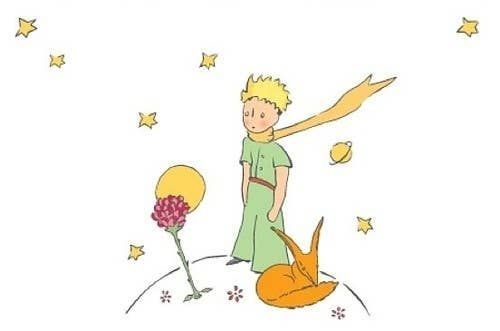
Those who know me a bit are aware of the fact that I absolutely LOVE Antoine de Saint-Exupéry's "The Little Prince". I bring it up any chance I get and because today has shown me again just how much this book means to me, I thought I'd use Tumblr as a journal and share at least a few of the reasons why. It is currently 2 am as I am writing this, so I don't guarantee for any of this to make any sense.
Apart from being the book my mum used to read to me when I was very little, apart from being the book I learned to read with and being the first book I ever read in every language I speak, "The Little Prince" is also just such a wonderfully poignant book that, for me, is just as important nowadays as it was back when it was first released in 1943.
It deals with themes we all encounter on a daily. It talks about greed, love, friendship, sadness, vainness, and wisdom — just to name a few of them. And it does so very endearingly. Part of this book's charm is not just that utterly beautiful and simplistic style of its illustrations, but also that it can be read by children and adults alike. It's generally easy enough to understand for children while also being so descriptive of the themes mentioned without the so usual moralising undertone that is often apparent in comparable works. And there are so many layers to the quite simple story itself that I find something new to focus on every time I read it.
There are sequences that did not really interest me as a kid because I did not understand the full extent of what they meant. Sure, I knew there was something to take away from every sequence, but I did not always know what it was. And as I keep going back again and again, I keep finding new layers to uncover.
Take the sequence about watching the sunset 42/43/44 times, for example (depending on what edition/ language you're reading). It only gained my interest when I was about sixteen, because it suddenly spoke to me on another level that was not just about describing a pretty sky. It expressed exactly what I felt at the time but never managed to put into words, and it helped me understand what it was I was feeling. Before then, I only thought the short chapter was about the nice colours that make up a sunset, about the hues that are usually quite warm and can feel comforting. But it is really so much more.
Sadness can cause many things; for me, it makes me lose interest in most things I used to enjoy greatly. That one page that discusses the little prince feeling sad and watching the sunset so often told me to go outside and look at the sunset, and so I did that. After that, I began to appreciate the beauty in nature around me more. The sense of calmness and clarity that I get when I walk in nature and listen to the birds or sit and watch the sunset (or sunrise, occasionally) is something I never managed to replicate otherwise. People rarely talk about how they are truly feeling in everyday life, and there is still some sort of stigma around talking about mental health, depression, etc., which I think shouldn't be (but that's an entirely different discussion). We all are happy to talk about the things that fill us with joy, that excite us, so why can't we talk about the bad feelings we have in the same way? It is easy to feel that being sad or even depressed is simply not allowed in society, that one is alone with all the bad thoughts spinning around and around, because we never talk about them.
That short sequence about sunsets taught sixteen-year-old me that it was okay to be sad, that it was okay to be okay one day and a total mess the next, only to be better again. It taught me that sometimes, you just need to take a second to sit down, breathe deeply, and look around, try to find the beauty in things you usually overlook or see the beauty you have become blind to. It also taught me that extreme sadness does not last forever, which is what I keep clinging to, now that I feel myself slowly slipping back into that seemingly bottomless pit of sadness.
Another sequence that has greatly influenced the way I see things in life is the part about the fox. The taming. Because that is just such a vivid depiction of what making a friend is. It is a metaphor even kids understand. And it is so true to the core. You have to reveal who you are as a person to become friends with someone, you have to share your thoughts and beliefs. You have to get over that "being friendly strangers" phase, and for that, you need to find out more about the other person, their likes and dislikes. And only then you can determine whether you like the person enough to become friends with them. That seems pretty straightforward.
Sadly, though, we tend to skip parts. We don't get to know each other enough to get to the "being tamed"-part. We consider someone a friend too soon, when all they likely are is a friendly acquaintance and nothing more. I realised recently that I did not know some of my friends as well as I thought I did and it caused a lot of unnecessary added heartbreak. You know, when you find people you like and you get along with them splendidly whenever you see them, which might be frequent or sometimes not so much, it's easy to feel as though you're friends. But do they still message you when things get rough? Do they try to include you when they do not see you around as much as before? Likely, they do not. Or at least that is what I have experienced.
This goes hand in hand with what the fox says to the little prince about the rose. “You become responsible, forever, for what you have tamed.”
Because that's what true friendships are like, or at least they should be. They don't just end, they don't just fizzle out. You can't just up and leave when you're bored or when you disagree. Unless there is a real reason for you to stop talking or stop being friends, you should always keep an eye out for your friends. You got to know them, you tamed them, and you are at least a tiny bit responsible for them, too. Certainly not for everything they do, no, but for the part of their lives that intertwines with yours. That is what you are responsible for.
And there are some more quotes that have influenced me greatly. I won't go deeper into them now, because, frankly… if I did, I would never shut up. I will just leave them here to read and ponder for anyone who wants to.
Maybe they speak to you as much as they do to me, maybe they don't. That's the beauty of literature.
“I must endure the presence of a few caterpillars if I wish to become acquainted with the butterflies.”
“Then you shall judge yourself," the king answered. "That is the most difficult thing of all. It is much more difficult to judge oneself than to judge others. If you succeed in judging yourself rightly, then you are indeed a man of true wisdom.” (Chapter X)
“Where are the people?” resumed the little prince at last. “It's a little lonely in the desert…”
“It is lonely when you're among people, too,” said the snake. (Chapter XVII)
“Language is the source of misunderstandings.” (Chapter XXI)
“Here is my secret. It is very simple: It is only with the heart that one can see rightly; what is essential is invisible to the eye.” (Chapter XXI)
“What makes the desert beautiful,” said the little prince, “is that somewhere it hides a well.” (Chapter XXV)
“In one of those stars I shall be living. In one of them I shall be laughing. And so it will be as if all the stars were laughing, when you look at the sky at night. And when your sorrow is comforted (time soothes all sorrows) you will be content that you have known me. You will always be my friend… I shall not leave you.” (Chapter XXVI)
And last, but certainly not least:
“All grown-ups were once children… but only few of them remember it.”
On that note…
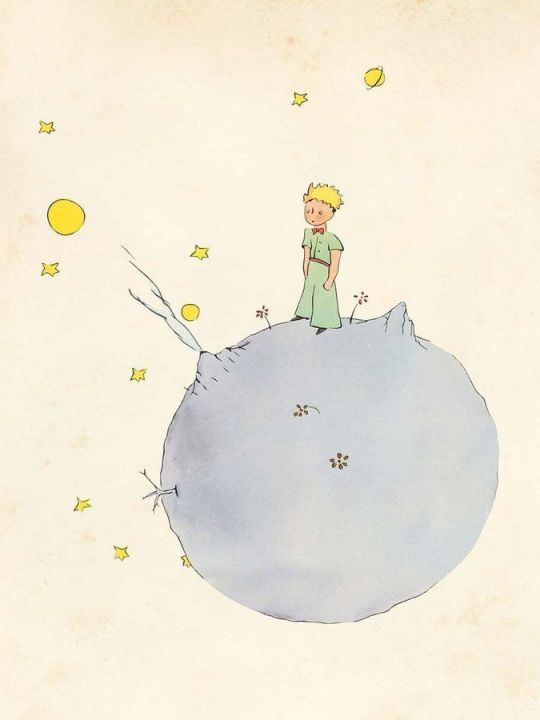
#the little prince#le petit prince#antoine de saint exupéry#books that saved me#quotes I live by#late night ramblings
10 notes
·
View notes
Note
what do you think of boris’ sexuality? do you think he externalizes his internalized homophobia? this is a goldfinch ask !!
ohhhhh this is interesting. so sorry for answering this a couple weeks late!!
first of all—boris is 100% bisexual. he absolutely expresses attraction to both men and women throughout the book, that boy is BI.
the second part is wayyy harder. i think that it's really difficult to tell from what we know of him—since the book is obviously from theo's perspective, we can't quite get inside his head the same way we can with theo, so i'm just gonna list out some examples of his,,, varying queerness tolerance level, i guess lmao.
he's casual about suggesting that hobie may be gay, and has a very calm reaction compared to theo's immediate discomfort.
similar to theo, as a teenager, he never brings up the times they've had sex.
he's flippant about mentioning that theo is "the only boy [he's] ever been in bed with", and brushes it off as "[they] both needed girls".
that's.... it, i think. at least off the top of my head. so my conclusion, to be honest, isn't based on a whole lot of proof, as opposed simply to drawing from other aspects of his character.
from his casual usage of the N-word after spending time with kotku, who was "cool"; his conversion to islam, not because he believed in allah, but because the muslim people around him were good to him; and finally, his attempt to pretend to be jewish in order to work for mr. silver, it's really easy to point out that boris conforms to various environments with ease, something that he's had to be able to do because of how much he's moved around. he's not doing these things because of personal beliefs, ideas, or opinions, he's doing them because he's trying to blend in, or in some cases, seem "cool", whether it's intentional or not (depends on the situation). that doesn't mean that his actions are automatically morally good or even neutral, but it gives us an understanding of why he is the way he is, and why he's so different depending on where he is and what point of his life he's at.
i think from that, it would be easy to argue that perhaps boris himself has no personal issue with gay people, but he would most certainly display the same homophobia that was so typical at the time it was written: ie. he would be casual about someone he knows being gay, but he's also definitely described things as gay, or said the word faggot in a derogatory context.
i'm not entirely sure how to relate all of that back to his internalized homophobia, simply because we don't get to see what that's like for him, or if that's even a thought on his mind. i think i'd argue that, what with everything else that's happened/currently happening in his life, he doesn't care all that much. i doubt he would ever call himself bisexual, or pansexual, or any of that; we can assign those words to him because he's a book character, but it's also important to recognize that those weren't words he would've grown up using, and that would likely stick with him in ways that some younger people would interpret as queerphobic. he's simply boris, and if boris wants to kiss a man then boris wants to kiss a man and that's all the thought he'd devote to it.
so yeah. i suppose i believe that he's homophobic, but not because he hates gay people or himself for being gay. i also think that he would not devote any particularly meaningful amount of time to dissecting who he is in regards to his sexuality, simply because it's never been a particularly important part of his life or survival.
20 notes
·
View notes
Note
ship asks 10-20 + aj x roman — @xoteajays
Thank you so much for this!! Also gonna tag @stelstellakidd since I know she loves Fast & Furious too. <3 <3
Do they share any hobbies or interests? How do these things bring them together?
Well, of course they do share a mutual love for cars, even if AJ’s interest lies more in modifying and suping them up then actually driving them, and, of course, all of the craziness the Toretto family gets up to and breaking the law in general. And these things bring them together in a lot of ways; in addition to AJ’s ties with the Shaw family quite literally being the reason they met in the first place, spending time with the team on adrenaline-fuelled adventures and committing smaller crimes together in between missions allows them to bond and reaffirm all the things they love about each other.
How do they feel about nicknames/pet names? If they like them, what pet names do they use? If they hate them, why do they feel that way?
AJ doesn’t like them very much, mostly because he’s kind of awkward with affection directed at him in general, but he doesn’t mind when Roman calls him “babe” or “baby”. Roman’s a bit better about them, but he’s still not comfortable with anything too mushy - he does really like when AJ calls him “love,” though.
Do they have a difficult time when separated from each other, or are they fairly independent?
They are both fairly independent people, but because of AJ’s anxiety, he tends to have the harder time when Rome’s off without him. It isn’t that he doesn’t trust Roman, but he does know the other man’s reckless tendencies all too well, and he often worries that he’ll get himself into danger if AJ isn’t there to act as his impulse control. Roman is a lot better about being left without his boyfriend; depending on where AJ’s going or if he knows where he is, he might worry, but mostly he trusts AJ to keep himself safe.
How do they keep in contact when they’re apart? Do they write letters, talk on the phone, or simply wait out the time?
They’re not often apart after AJ becomes an official member of the Toretto team, but when they are, they usually content themselves with texting each other, or doing a video call if there’s time for it; neither of them could stand just waiting out the time until they’re reuinited.
Do they enjoy PDA, or are they more private with affection?
They may hold hands in public or, if they’re going their separate ways, share a quick kiss before they go, but nothing beyond that; AJ’s too awkward with affection for anything else in the presence of others, and although Roman has gotten to a much better place with his feelings about his sexuality and love for AJ, there’s still a part of him that gets nervous at the thought of being too affectionate around other people.
What songs remind you of their relationship?
“Tough Love” by Avicii, “Delicate” by Taylor Swift, and “Good Old-Fashioned Lover Boy” by Queen.
Would they ever get matching tattoos? If yes, what would these look like?
I don’t know if they ever actually would, and if they did it would be AJ’s first and only one because he’s terrified of needles, but if they did, the tattoos would be matching sports cars on their forearms.
How well do they communicate? Are they open with their feelings/thoughts or more reserved? Why?
They are… not fantastic at communicating, mainly because neither of them are very good with emotions in general (AJ more with properly communicating them and Roman more with expressing them in general). This can cause problems in their relationship, but they do try to make the effort because they know it’s important.
How do they care for each other when one of them is wounded/sick?
If it’s a person who’s hurt Roman, AJ will actually get angry, raring to go out and get revenge on the person who hurt him, but he will make sure he’s okay and his wounds are properly tended too first. If he’s sick, however, he will absolutely dote on his boyfriend, making sure he has everything he needs and checking up on him as constantly as he dares without getting annoying.
Roman isn’t as good at taking care of people, it doesn’t come naturally to him, but he will make sure to be right by AJ’s side and lean on the people around him for extra support. If AJ’s injured, he’ll leave the patching up to Mia or Brian, hold AJ’s hand the whole time, and be at his side the whole time he recovers; if he’s sick, he’ll call Tej because he makes the best chicken noodle soup, and make sure to make a list of all the things Mia told him help best for sick people so he never forgets for next time.
Do they wear each other’s clothes/jewelry?
It’s mainly AJ wearing Roman’s clothes, since AJ’s are too small for Roman to wear, but he will occasionally snatch a shirt or jacket that Roman will vehemently deny that he finds cute, and they also get matching chain necklaces after two years together.
How do they comfort each other when one of them is upset? Is this method of comfort effective?
AJ isn’t very good at verbal comfort, so his usual method of comforting Roman is just to tuck himself into his boyfriend’s side and lay his head on his shoulder, giving Roman all the time he needs to speak or return the contact and making it clear that he can tell AJ to leave if he needs to. It’s his way of making it clear that he’s right there with Rome no matter what, and though it may not always work immediately, it does always work.
Roman, however, is a very verbal person, as we know, so if AJ is upset or overwhelmed, his usual tactic is to just start talking - telling a random funny story, sharing memories about him and Brian as kids, anything lighthearted that he can think of. It’s a trick for bringing AJ out of his head and cheering him up a bit, and though it can be hit-or-miss, it’s always done with the best of intentions.
ship ask game!!
2 notes
·
View notes
Note
Hey Houngan Alex, I left my Sosyete years ago (respectfully, and only after many attempts to work out our ethical differences as a House) and there's something I've always wondered about. Is there any kind of ceremony that needs to take place to let someone leave a Sosyete, and does that ceremony involve the po tét?
Months after I stopped coming around, I was told I needed to bring my po tét to my Mambo for a ceremony so her Lwa could formally release me. It was emphasized that she would give it back to me, and this was not punitive or a big scary deal, just a traditional formality that would let me continue as a Mambo without issue. "The right, traditional way to do things".
I was suspicious, so I reached out to a brother I trusted who'd been in the Sosyete for decades. He told me it was true, and echoed that this was totally safe, NBD, just a formality.
This was years ago and I never did it, of course. I'm sorry but absolutely nobody is touching my po tét. I was not surprised that my Mambo would suggest something like this, but I lost a tremendous amount of respect for the brother who encouraged me to do it.
I'm wondering if there's some kind of totally legit, sensible precedent to this within the tradition that isn't centered around cutting a person off from their Lwa, or removing their stability. This doesn't keep me up at night, but I trust your knowledge and it's something I've always been curious about.
Thank you for all you do for the community.
Hi,
I have not heard of this specifically and it's possible that it is something specific to that sosyete but there are some things that concern me. In my experience, this would not be common or accepted.
There is a part I find pretty troubling, about having her lwa release you. That's just something that doesn't exist, because you have your own lwa. You are not living under and serving her lwa, you are living under and serving her lwa, and she has no control over that and no right to meddle with it.
Further, when you undergo ceremony that produces a po tèt, that work is irreversible. It can't be taken away or cut off simply because you choose to no longer be a part of a sosyete. If that were so, people would be stripped of titles and initiations and that's not possible. It doesn't matter if it was a lave tèt or a kanzo, it can't be undone or removed from you. It is irreversible. There are ways it can be modified or overwritten, like if you had a lave tèt and then did a kanzo in a different sosyete or were made a hounsi kanzo or sou pwen in one sosyete and took the asson in another sosyete...but what was done can never be undone, and that is why it is so important that people discern before committing (not saying you didn't, speaking generally only).
I would also feel pretty resistant to someone I was breaking off a relationship with touching my po tèt. It is literally the seat of my soul and being, and I would question why and how someone would need to touch it as part of parting, because there is literally no work necessary. Po tèts are very rarely worked on for any reason post ceremony and really only addressed in the case of imminent death or grave illness; that is when a spiritual parent or someone they designated would do work on it.
There is no process to leave a sosyete, really. Like, if you (in general) are leaving on good terms it's good to have a discussion because issues can be addressed even if they are irresolvable but it's not necessary. I know a lot of folks who have left sosyetes; some leave after conversations, some leave after a massive falling out that is visibly messy, and some just fade away.
Part of the reason there is no process is that once the work is done, it's done. There is no control factor in a lave tèt or kanzo; your ceremony is not dependent on your relationship to a person and your relationships with your lwa are likewise not dependent on the person who did the ceremony. Is it ideal to stay in the same sosyete and learn from the same person? Yes, but ideals don't always work out. If I chose to leave my spiritual mother and sosyete I was initiated in, it would be painful but there would be nothing for her to do about my lwa and my title.
It's also something that is not that uncommon, particularly in Haiti and particularly for people who are not asogweman. It's not unusual for people to be made senp or sou pwen in one sosyete and take the asson somewhere else. I know folks who do senp or sou pwen in a family temple, but then find themselves led somewhere else. Sometimes folks might relocate geographically and it may make more sense to do their ceremonies somewhere else.
From what you describe, you already know there were issues where you were and your lack of surprise should inform you. It sounds like there is an aspect of control in this situation that just doesn't exist in reality and that sounds like an environment where growth may not be encouraged.
I hope you are feeling supported wherever you are now. Happy to speak privately with you if that would be helpful.
3 notes
·
View notes
Text

repost and rate your muse's traits out of 10 in each category !
COMPASSION: 6/10. Sees people around him, and will go out of his way to help people, especially in little ways that are just very doable and why wouldn't you. Also, though, has greater commitment to loved ones than to strangers. He is more likely to be moved to action for people he feels connected to, some way. This can be as little as 'seemed like they were having a bad day', but as the stakes get higher, the circle narrows.
BITTERNESS: 2/10. There's a little bit of an edge, but it's really more frustration than bitterness, I think. Things could be so good if people would just let them be. But he doesn't feel owed. He just feels like people make it harder than it should be.
HAPPINESS: 8/10, generally. There's a little bit of an edge, how else do you end up at frustrated and willing-to-punch-things-into-order?
POLITENESS: ...3/10? He can sometimes just fall into 'polite' because his baseline is chill+nice until given the need to be otherwise, but he very rarely if ever adheres to Politeness as an intentional practice and standard. He also doesn't like the idea of manners being more valued than truths. Impertinent is a good word for it, really.
MORALITY*: idles at like a 6/10 but Henry... flexes. And contradicts himself, sometimes. He is, broadly speaking, in favor of helping others, or at least striving to not bring harm. However, he is also centered on people in his circle, and is pushable to excusing things as long as his people aren't harmed; he also has a tendency to answer violence and harm to himself/his loved ones with retaliatory harm, & sometimes capable of taking this Too Far.
PRIDE: 4/10. Not non-existent, but not, generally, more important to him than his life, others' lives, the truth, etc. He's skilled and confident, but also if he's wrong he's wrong and if it's beg-or-die he's begging. If you insult his mother, however, he will kill you. (That is an exaggeration (probably.))
HONESTY: 7/10. Very honest in the sense he is who he is and doesn't shy from it, doesn't feel the need to hide it. Rarely outright Lies and more often deflects or simply refuses to answer, when it feels necessary. Also, though, he's got a sneaky streak (mainly in a being-places-he-knows-he-shouldn't way, never met a locked door he liked) and it's not a compulsive habit but he has been known to pocket things without paying, here and there.
BRAVERY: 9/10. Absolutely terrified: stands his ground in front of the scary thing anyway. Docked one point for being slightly cagey when it comes to talking about the things that scare him. (He's afraid to give them more power to frighten and maim with his words. Ghosts may be hard to get rid of, but myths are impossible to kill.)
RECKLESSNESS: 5/10. I know what you're thinking. I know why you're thinking it. I agree, he is very impulsive. He also, and I will die on this hill, is way more measured than people take him for. It's true he can be goaded into not thinking at all, and he is, in general, quick to act. However! I think he bows to his impulses only around half the time, and it's just that he's struck by impulse so often that only indulging it around half the time means it's still a defining trait for him. This is also what makes him so easily frustrated — you're only seeing half of his go!go!go!, he's already holding himself in check, so people going "uh, hold yourself in check" is just. A very frustrating experience. Imagine you're walking and people keep blasting whistles in your ear to go 'no running!!!' at you like you're breaking the rules >:[
AMBITION: ..5/10? 6? In terms of when he has a goal, he'll go to every length to achieve it. Ultimately, though, his goals are usually just "the people I care about (including himself, btw) are happy and safe." Everything outside of that isn't necessarily important to him. So it really just depends on what level of 'my people' he's at, as for how ambitious this goal is.
LOYALTY: 10/10. You can't get rid of him if you try, once he's grabbed on. Even if you hurt him.
LOVE: 10/10. Heart on his sleeve. He's not afraid to get close to people, not afraid for them to know it, not afraid to be known - prefers to be known, in fact. I think he's pretty easy to love, too. He is, notably, several closed off characters' weak spot.
SENSE OF FAMILY: 100/10. I told myself I wasn't going to dick around with the greater-than-ten value numbers, but. C'mon. The key to a Henry corruption arc lies somewhere in his unwillingness to let go and the way his people can be used against him.
ATTRACTIVENESS: .. 8? 9/10?? I'm biased about his literal appearance but I feel like it's gotta be... if not more, then equally about his nature. Which I guess is also a 'to each their own' kind of situation, but like. He's warm and reliable and communicative and supportive and earnest and a little bit possessive and there's that surprising edge of wildness and he's got big stupid brown eyes like. I dunno man I feel like a lot of people would fold, at some point. Like come on.
AGILITY: 6/10. Stronger than he is fast, but he'll surprise you with it. Reaction time is very important if you want to work the rigging of a ship. Henry's is reliable, without being flashy or gimmicky; it's more to do with him being attentive than being above-average nimble or anything; suffers/goes down when he's distracted/overwhelmed.
SEX DRIVE: like.... 7/10. Pushing toward higher than average. Not to the point of distraction/preoccupation, but he's definitely down & interested more often than he isn't, if that makes sense? And also very curious, in this regard. In every regard really but here it's relevant.
#*this used to be ''chivalry'' but. if you use the modern definition that's basically just ''politeness'' again to me?#but if u poke at it it used to be like. code of morality so#(shuffles my dash game) ds;lfkjsl;dkjfg#every family has a myth for the young to inherit ( dash game. )#there's a light that never goes out ( hc. )#i stole this because tagged/tagging kills my brain please steal it !
2 notes
·
View notes
Text

I have some Headcanons for Kaz to share in reference to his trauma / haphephobia. A couple of them involve vague mentions of ~intimate situations~. Also updating this a bit from the last time.
It's never really explicitly mentioned in the books, but I suspect blood is one of his triggers—although fresh blood isn't as much of an issue as I think it has a lot to do with scent rather than the physical sensation of it. It's the sickeningly sweet, rotting coppery scent and if he's stuck with it on him long enough, it can easily lead to a panic attack, getting physically sick and/or a fainting spell. It's also very likely the reason why the only time he gets someone's blood all over him is either when it's a last resort or when he just .... loses his cool, which doesn't happen very often. In SOC when he rips that guys' eye out, they change POV after Kaz goes bellow deck to clean himself off and stuff and like ..... I think about that a lot. Might write a drabble abt it some time, who knows.
His reactions to getting badly triggered are within a certain range and it depends on a lot of things, but - symptoms include severe shaking and panic attacks, breaking out in a cold sweat, hallucinations, nausea, vomiting, dizziness, exhaustion and/or fainting. His natural response for this is also very severely in flight, so he is most likely to get tf out of the situation if he's able to.
When/if Kaz gradually starts to work through his touch aversion issues in order to be able to physically touch someone casually or intimately, he is ... very intense once he's comfortable. Because of his aversion, he's also very touch starved, which becomes immediately obvious very quickly in that case.
I think, when it comes to kissing someone, that is likely one of the easier things to work through for him simply because of how stark the contrast is. Like, the heat of someone's mouth, the intimacy of being able to hear and feel someone's breathing, feel how very much alive they are. And for that reason, it becomes pretty immediately apparent how much he enjoys it once he gets there.
One of the ways he keeps himself grounded during situations with any bare physical contact is being able to feel someone's pulse, which he can do by either feeling for it by resting his hand on their throat / pressing his thumb against their pulse point there, doing the same on their wrist(s) or their chest.
However, something important to note; it will absolutely take a lot of tries, trial and error, for Kaz to be able to work through these things. Depending on where we are in the timeline, he is probably going to have several panic attacks along the way and it's gonna be a rough start; it's especially going to be complicated and very, very meaningful for him to allow someone to be anywhere near him when that happens too, so it'll require a ton of thorough plotting. I don't mind skipping ahead, as long as we thoroughly discuss and establish the difficulty in Getting There.
On that note, I also firmly believe that Kaz achieving his goal of not only getting Pekka tf out of his city but just ... bringing him down to his knees and getting his revenge was a much needed step for him re: his healing process. Kaz is no longer hastily covering his infected wound with a shitty band-aid, where every single time he brushes up against it, he gets fucked up. Post CK, it's a scarred over wound that will always be there and it causes him pain and difficulty still, but ... overall, things are a little easier. I mean, not always and he has his ups and downs, but ... he's doing better.
I will also say that, as someone on the asexual spectrum myself, I am 5000% very, very flexible about what intimacy would mean for him. Smut does not have to happen for Kaz to be intimate with someone; literally him letting someone hold his hand is a very huge indication of intimacy for him okay. There's a part of him that deeply, deeply struggles with shame regarding his trauma and limitations because of it, so. Someone eventually knowing What Happened and insisting on giving him the space and patience that he needs and/or being like "you don't actually have to Ever btw" despite his stubborn attitude sigh lmao is 👌👌
Kaz's struggles with touch will never fully be gone, no matter how much he works through it. There will still be days where he can't handle physical contact and there will be days where he's handling things just fine but the slightest thing twists the wrong way and he has a panic attack or can't touch anyone for hours or the rest of the day, ect. It's always going to be there in the back of his mind, being considered with everything he does. And, even with working through it to be able to touch Certain People or Someone In Particular, he still won't be able to deal with it casually, with people he doesn't know well or trust. It's especially Bad if it's not anticipated.

#tw; blood#added some things to this and tweaked some things too!!#Kaz's touch aversion / trauma means everything to me tbh#I love exploring it and I love that it's something that canonically will never completely go away for him no matter how far he gets#aNYWAY#a good magician wasn't much different from a proper thief. ( CHARACTER STUDY. )
3 notes
·
View notes
Text
A not so “mini” mini-essay about writing advice.
This may be old news and entirely obvious to everyone, but this is MY internet void space and I get to put my thoughts down here if I want to. That being said.
“Only write things that are essential to the plot. If it does nothing to further the story - get rid of it.” Is a piece of advice that I heard a bunch of times, and I have things to say about it.
I’ve been hearing this advice since I was in middle school, just learning how to staple together a story, and it always felt so mean to me. Same with “kill your darlings” though I’ve come to tolerate that one a lot more. But this whole “whatever doesn’t further the plot must be cut” always sat wrong with me.
I think its partially because often times it had been used by people around me to tell me (the author) what I should cut or keep. I had people telling me that things that seemed to me extremely important were actually irrelevant and should have been cut. But that’s not exactly fair, is it?
It creates the notion that all stories have the same priorities. Any book/movie/narrative must follow a plot and have its purpose, comply with story structures and fulfill audience expectations. It creates a conventional cookie cutter for a story which the author may simply fill with whatever the current trend of storytelling is. But if you pose a wider question to the audience “what is essential to the story? What does actually further the plot?” You probably won’t have everyone come to a consensus.
To some it may be simply the hard actions that encompass the journey and its destination - how things began, how they ended and what troubles happened in between. But then the question arises - are those hardships relevant to the plot? Does the story really need the struggle, especially if it’ll be overcome anyway? Is our ultimate story actually just “hero needs to do thing - hero does thing”? Or is it that by getting rid of the issues within the journey that we’ve made the story itself obsolete and therefore must cut it as well? Which then of course eventually becomes the question of: does your story need telling? Do people need to hear it at all?
A lot of the things I was told as a teenager were irrelevant to the story were things about emotions. Subtle elements of a character’s backstory that inform their decision making throughout the plot, even if the actual element never reenters the narrative. Is then what we need to move the plot further - information? Do we need to keep in only the things that make the story comprehensible, getting rid of any embellishment that god forbid may obscure some parts? But then what’s the point of detective novels, or postmodernist obscure fiction, stories that are based entirely on misleading and confounding the audience’s understanding of itself? This, of course, brings up the important question of what the barrier is between the author and the audience. Do the readers get to know as much as the author? Do you leave them in the dark to reach their own conclusions? How much of the story is dependent on who it is consumed by?
Additionally, many people are of the belief that stories need to have some sort of moral. A lesson for the audience to take away and carry with them for the rest of their lives as a reminder of what’s really important. Of course, in the current world of fast paced information, media trends, and an absolute flooding of content, that timeframe may be as short as a few hours. Most stories hardly stick with audiences long enough to even elicit an emotional reaction, let alone actually affect them on a deeper level. And while the argument of what it really means to be changed by a piece of media is a super interesting one, it’s also not all too relevant here. The question we have here is about whether the things that a story ACTUALLY needs are all the elements that reach the audience, convey the message and encourage an empathetic and analytical interaction with itself. One might say that that is what’s essential to the story and needs to be kept in at all costs, but… The same story doesn’t have the same reception in different groups. Some stories lose their affective quality over time. Do those stories then cease to be relevant and must be cut? Does the author actually, truly have the control to bring forth the needed reaction and prompt the “right” kind of discussion from the audience? If the fate of a narrative is to be consumed by an audience, then shouldn’t the audience’s intention to interpret be consider above the authors intention to persuade?
And that’s when it kind of clicked for me what I found so unnerving about this piece of writing advice. Some people may have found it useful and that is wonderful for them, but I think the main thing that I take issue with is… It instills insecurity. All of these questions that have been asked in this mini-essay don’t have definitive answers. It’s not easy telling what’s relevant and what isn’t, and it brings on further doubts, eventually making you wonder if you should be trying to say something at all? Why write a story if it’ll have an ending? Why write a story when you could have a series of factoids? Why write a story when the audience will take from it only what they want, if anything at all? Not to mention the criticism levied against writers of indulgent “pointless” stories, such as fanfiction and erotica: why write if you, presumably, don’t have something deep, compelling and high-brow to say?
I resent this notion - the whole concept that a story must be something, and has to be a particular kind of way. I resent the idea that people are made to feel a certain way about their writing based on simply whether parts of it should have the right to exist. Especially since there isn’t even a consensus on the matter alongside literary academics. Literature will always be subject to debate, to discourse, just like other art forms. The idea that something has to be important in order to exist? I think it’s stupid and capitalistic at its core. Even if I, as an individual, find something unimportant or unappealing, that doesn’t mean I get the right to say that it needs to disappear. The author is trying to communicate something, whatever it may be: world altering philosophical ideas, political propaganda, high-stakes emotional turmoil, or the typical kind of excitement people get from erotic fiction. Whether people will listen or respond positively is another thing, but communication is an important tool under humanity’s belt. We shouldn’t limit it based on a theory that may he obsolete within the next year.
If anyone does want advice in regards to killing your darlings and getting rid of the fluff in a story, may I offer you something first: consider what kind of story you’re trying to tell. Identify your priorities in this particular narrative and use that to decide what’s relevant. Sometimes a story doesn’t need to make sense, sometimes it can just be stupid fun. A story about people having a nice swell time and a story about people suffering are not likely to prioritize the same elements. The things you include and exclude are just as much a part of the story as what it ends up being in the end. Know what informs your decisions and consider if this is what you, the author, want.
Also don’t listen to random people on and off line telling you what to do without applying critical thought. If it’s upsetting to you that someone may look at a story and immediately move on to something else, maybe remember to practice engaging with texts critically and not just drift in the ocean of contradictory content. Peace.
6 notes
·
View notes
Text
Turns out I have more to say.
So people in the notes of this kept saying "but sex is a choice! We're making this argument because sex is optional and menstruation isn't!" and first of all: WE KNOW. Nobody here was confused about that, and nothing about that statement contradicts anything that was said in the original post. It also doesn't make the comparison any more sensible or legitimate.
Secondly, let's unpack the "sex is a choice" thing a bit more.
Yes, technically, on an individual level, sex is a choice. It's not like having to eat or breathe. Having sex with other people is not necessary to any one person's continued survival or basic health.
However on a broader societal level, when it comes to preventing things like unwanted pregnancy and the spread of STI's (as well as the social costs these things entail), it's been well-established that the most effective approach is to accept that sex is a thing people are going to be doing, and provide them with education and resources accordingly. Yelling "just stop fucking!" at people without providing any of those things does absolutely nothing to prevent the above issues. If anything it makes them worse. We should treat sex as an inevitability on a societal level, even though it doesn't need to happen in any one given situation. That's why access to free contraceptives and prophylactics is a necessity, not just a case of "yeah it's great but we actually need this other thing".
And the weird thing is that people will acknowledge this and go "ok but I wasn't saying we shouldn't have free condoms! I think we should have both! I'm just saying that sex is a choice!" Ok... why? Why do you feel the need to "just say" that? If you agree that both things are important, why is there this need to keep labouring the point and repeating 'but you don't have to have sex!' over and over again? Why bring up condoms at all? Because again, the argument that menstrual products should be freely available holds up perfectly well without doing that, and there are better examples to compare it to. It's not either/or, so why treat it like a competition or a referendum on which one is "more important"? Especially when the original post brought up the AIDS crisis specifically, harping on about "oh well people could just not have sex" begins to cross over into being downright insensitive.
Another weird thing is when people who presumably read the original post (or at the very least skimmed it) still come into the notes to go "but condoms are free because men like to fuck" without acknowledging the refutation in any way.
Like, I'm not denying that the society we live in frequently treats (cishet) men's sexual desire as this super-important thing that we all have to prioritise, even at the expense of other people. But that's not an excuse to keep framing free condoms as just a product of that and nothing else, or not even bothering to ask questions like "what is the actual history behind this, who were the people that campaigned for this, what kinds of organisations are providing these things, what was the overall aim here" instead of just parroting this claim like it's gospel truth simply because "it makes sense". Again, read the original post.
I just don't think there's any claim this comparison supports that you couldn't argue for in a different, much more effective way. If anything it just derails the point by motivating people to start arguing about the necessity of this or that thing.
(Also side note for the folks who are legitimately confused, when people say "condoms are free" they mean that depending on where you live there are sexual health clinics, university campuses, certain bars etc. that provide them as a free resource. This might apply to your local area so you could do some research if you're interested. Obviously condoms aren't always free and you have to pay for them at the pharmacist's and so on. It's meant in the same sense as "toilet paper is free".)
I NEED people to understand that condoms aren’t free because “MEN like to FUCK lol,” they’re free because thirteen thousand people die from AIDS every year in the US alone.
Stop framing free menstrual products as more essential than free condoms. They should BOTH be free.
104K notes
·
View notes